Tucked away in the gateway of the Japanese Alps, Takayama is the town that made us fall in love with Japan.
So much so, that we’ve visited Takayama three times.
But unlike other destinations out in the mountains of rural Japan, you don’t need a car to see the best of Takayama.
In this guide, I’ll share all the best things to do in Takayama, so you can plan an unforgettable trip to this Japanese mountain town.

17 Awesome Things to Do in Takayama
Hida Folk Village
The Hida Folk Village provides a view into how the people of the mountains of Japan used to live. This open-air museum is home to over 30 traditional houses from the Hida region, preserved in a picturesque setting.
The wooden houses in the village date back as far as the 1600s. Many have displays inside, showcasing the tools and everyday items used back then. Walking through the houses is like taking a step back in time.

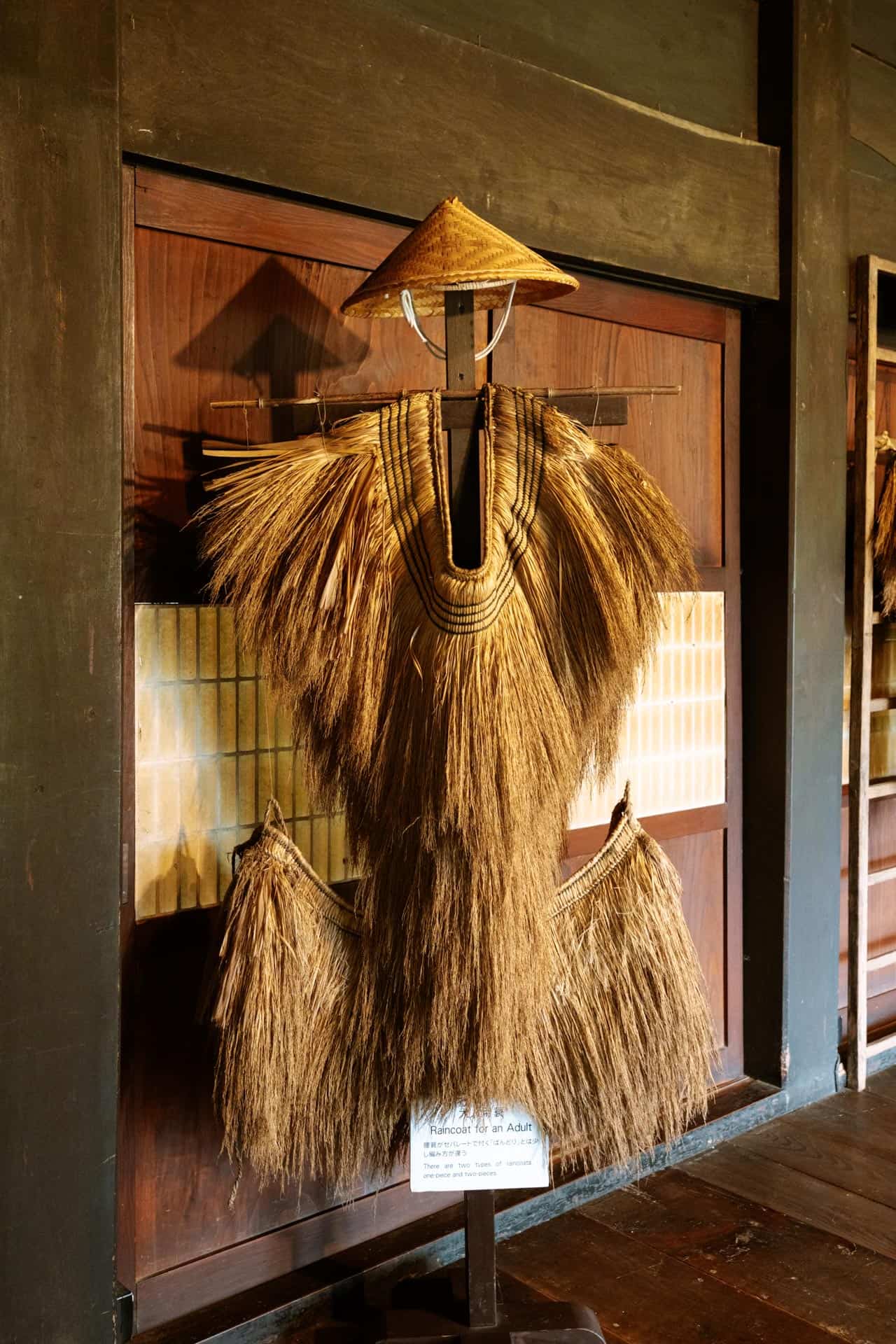
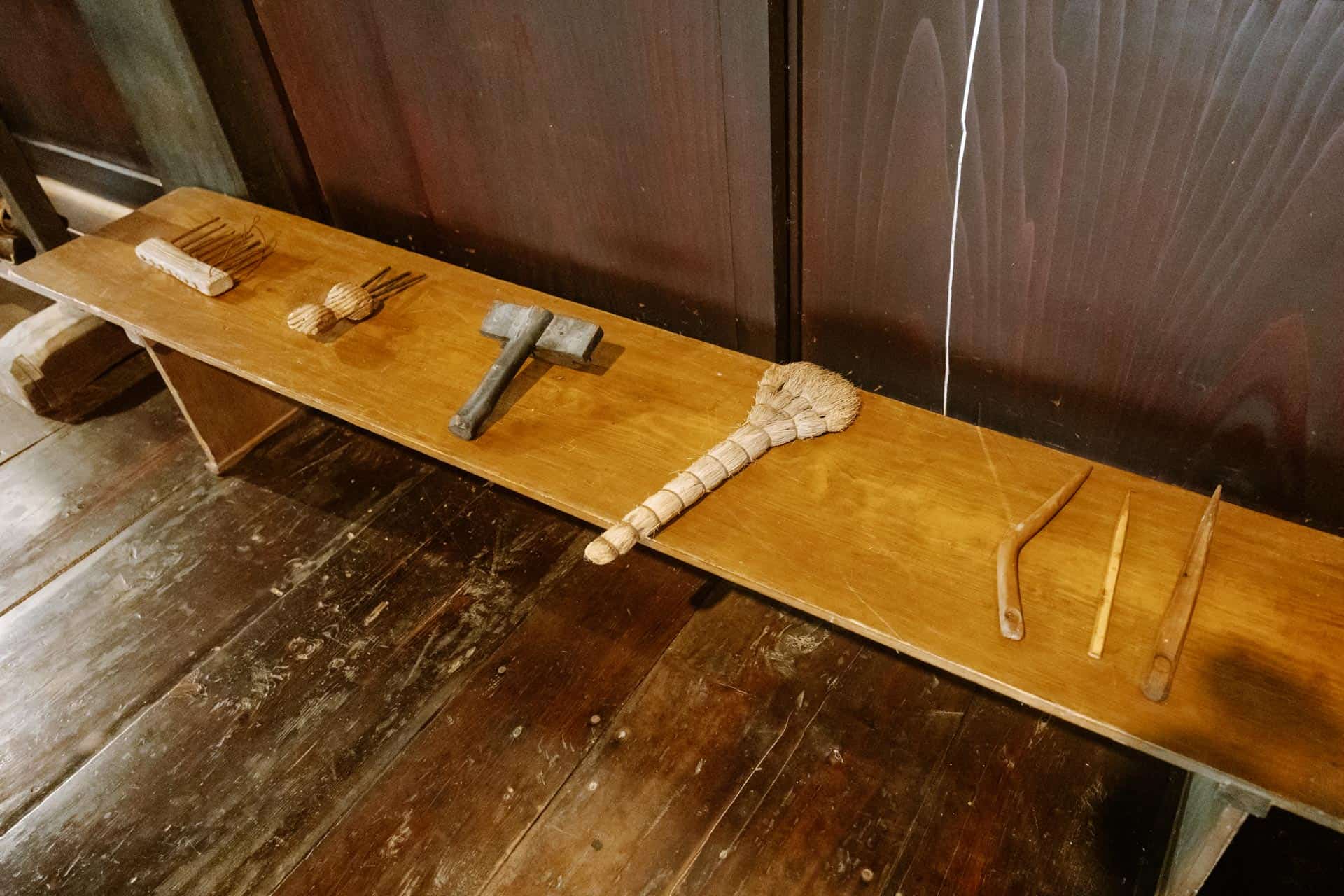
There are many interesting things to see in Hida Folk Village, especially if you want to learn what life was like during Japan’s Edo period.
When we visited Hida Folk Village, we thought we would be in and out of it within an hour or so. But we were there for over three hours!
Each house in Hida Folk Village is unique. For example, one house has an entire exhibit on making silk, including the tools used. Another house is a blacksmith’s house, showcasing the iron tools used during the era.
Read our full blog post: Hida Folk Village (Hida no Sato) in Takayama: Complete Guide
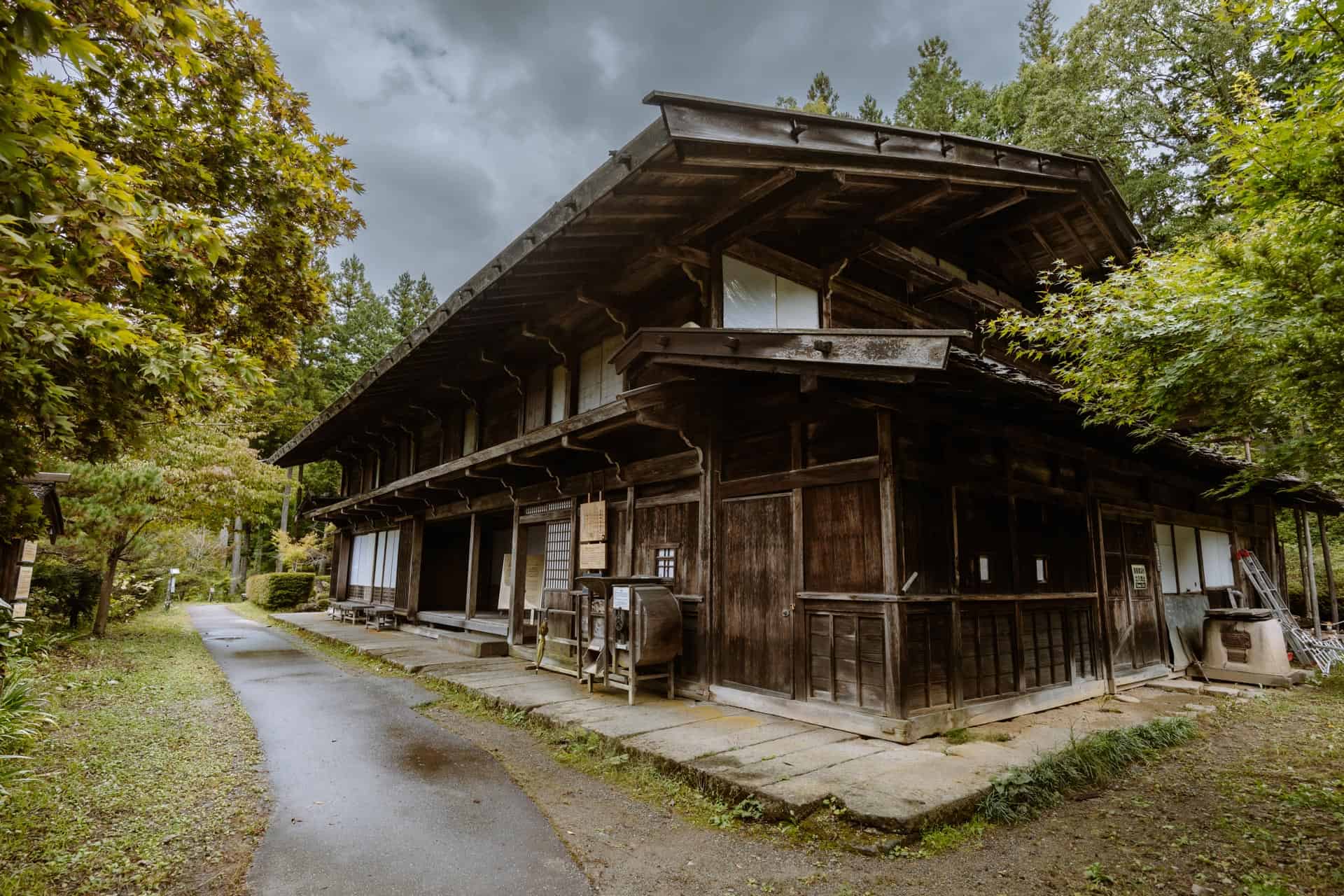
Want a Guided Tour? A private tour by a local can help you learn how the people of Japan lived in the mountains. Get Hida Folk Village Tour Tickets here.
Visiting Takayama in late May? Check out the Takayama Jazz Festival at Hida Folk Village.
Sanmachi Street
In the center of Takayama’s old town, Sanmachi Street stands frozen in time. Lined with wooden merchant houses from Japan’s Edo period, it’s a representation of what a Japanese castle town was like.
During the day, the street opens for business with eateries, cafes, souvenir shops, and sake warehouses.
It’s a fun place to explore for a couple of hours to check out what’s in the shops, hop into a restaurant, and sample some sakes.
Sanmachi Street is a popular spot to take photos next to the Edo buildings. Go early in the day to get a photo without all the crowds.

Homeitaigumi Preservation Area
On the north side of Takayama’s Old Town, you’ll find a quaint area with beautifully preserved edo-era buildings. Homeitaigumi Preservation Area is home to traditional houses that serve as museums of what the buildings from Japan’s Edo period looked like.
Unlike Sanmachi Street, Homeitaigumi stays quiet all day long if you’re looking for a more peaceful area.
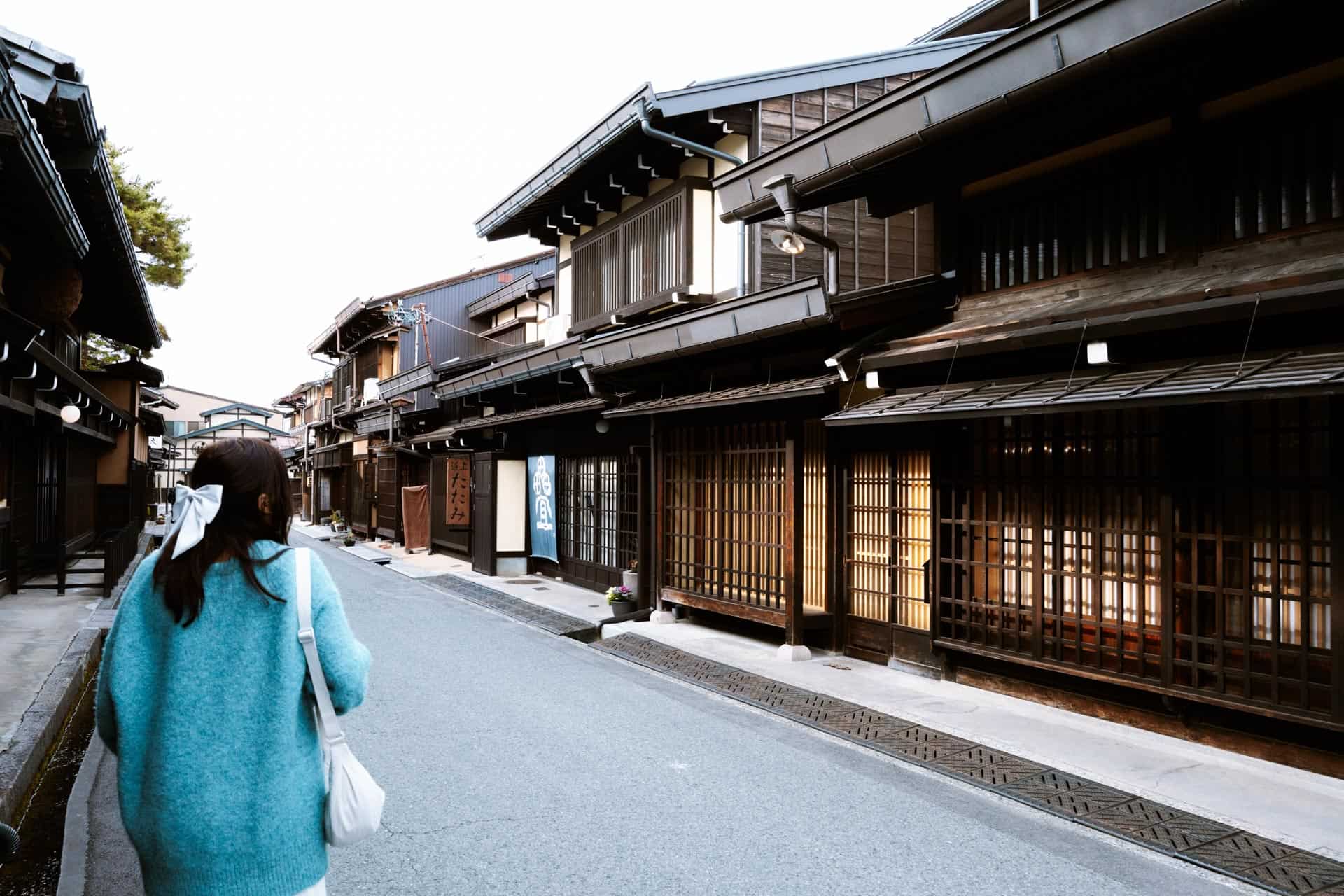
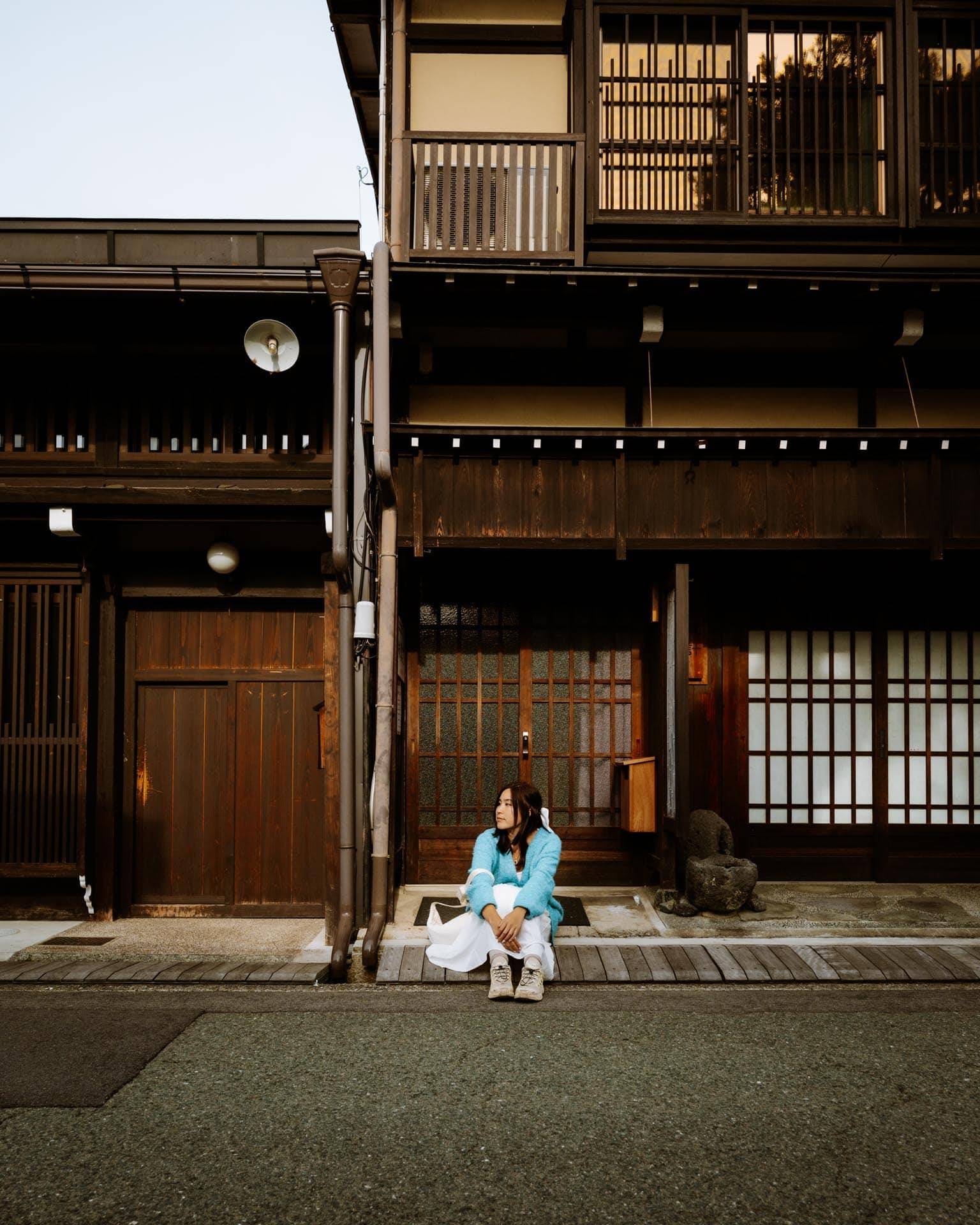
Explore Takayama on a Bicycle
Takayama is an awesome town to bike around, and it’s safe to ride and park your bicycle almost anywhere.
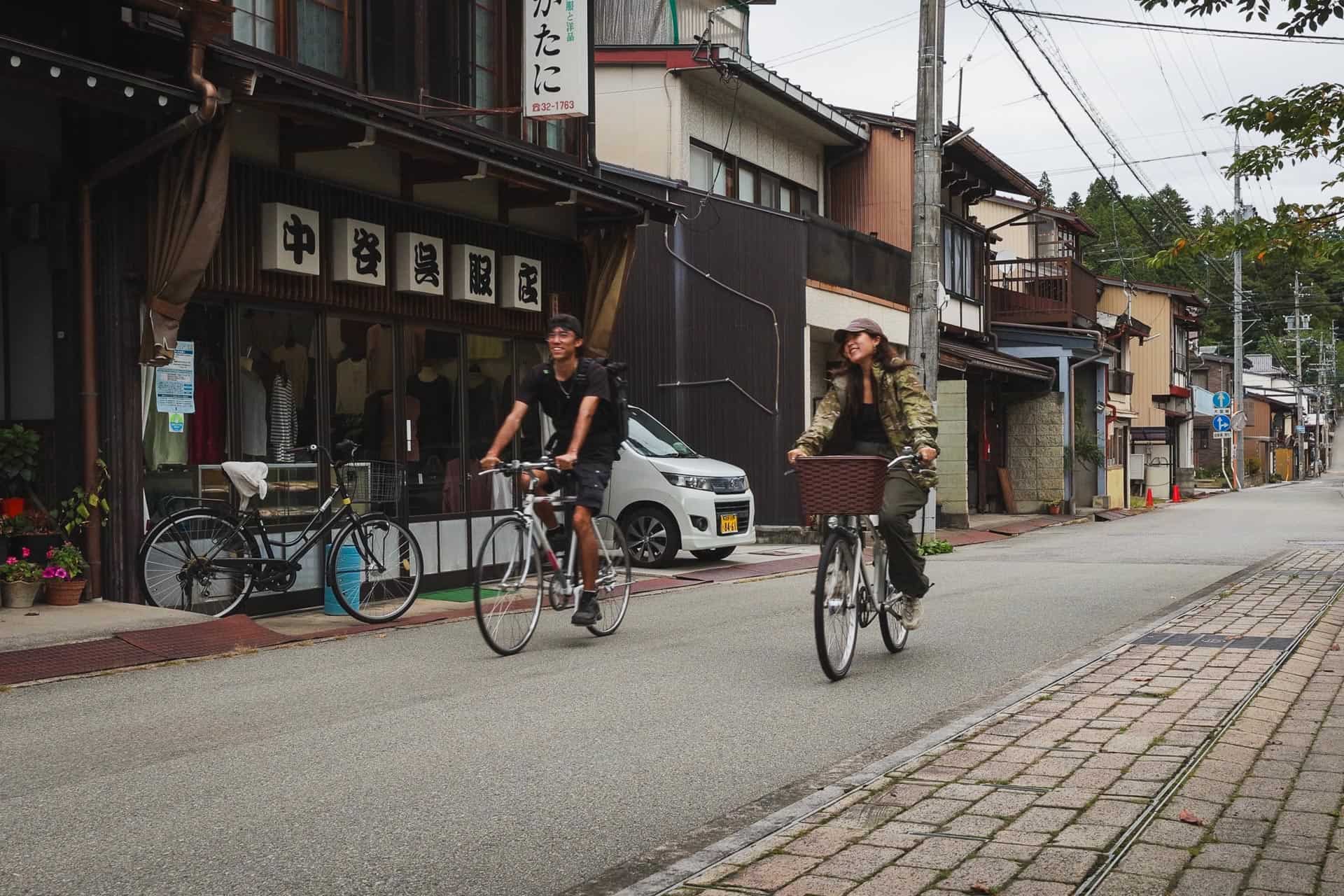
Higashiyama Walking Course
The highlight of the walking course is the Higashiyama Temple Area, an area with 2 shrines and 10 temples all lined up right next to each other.
If you’re on a tight schedule, you can walk through the Higashiyama Temple Area in less than an hour.
If you choose to do the entire walking course, it also circles Shiroyama Mountain, where the Takayama Castle Ruins are located.
Read our full blog post: Higashiyama Walking Course in Takayama: Complete Guide
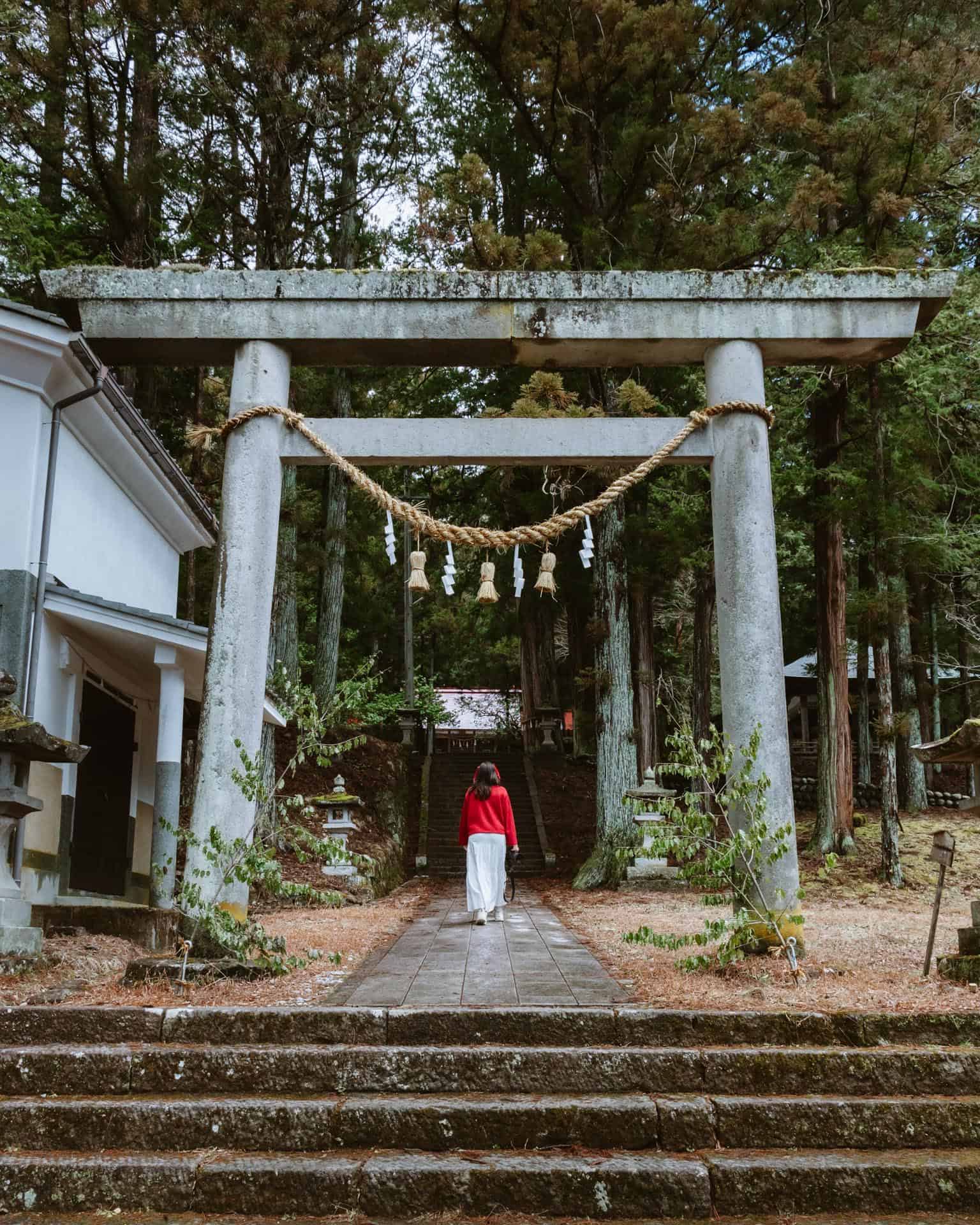
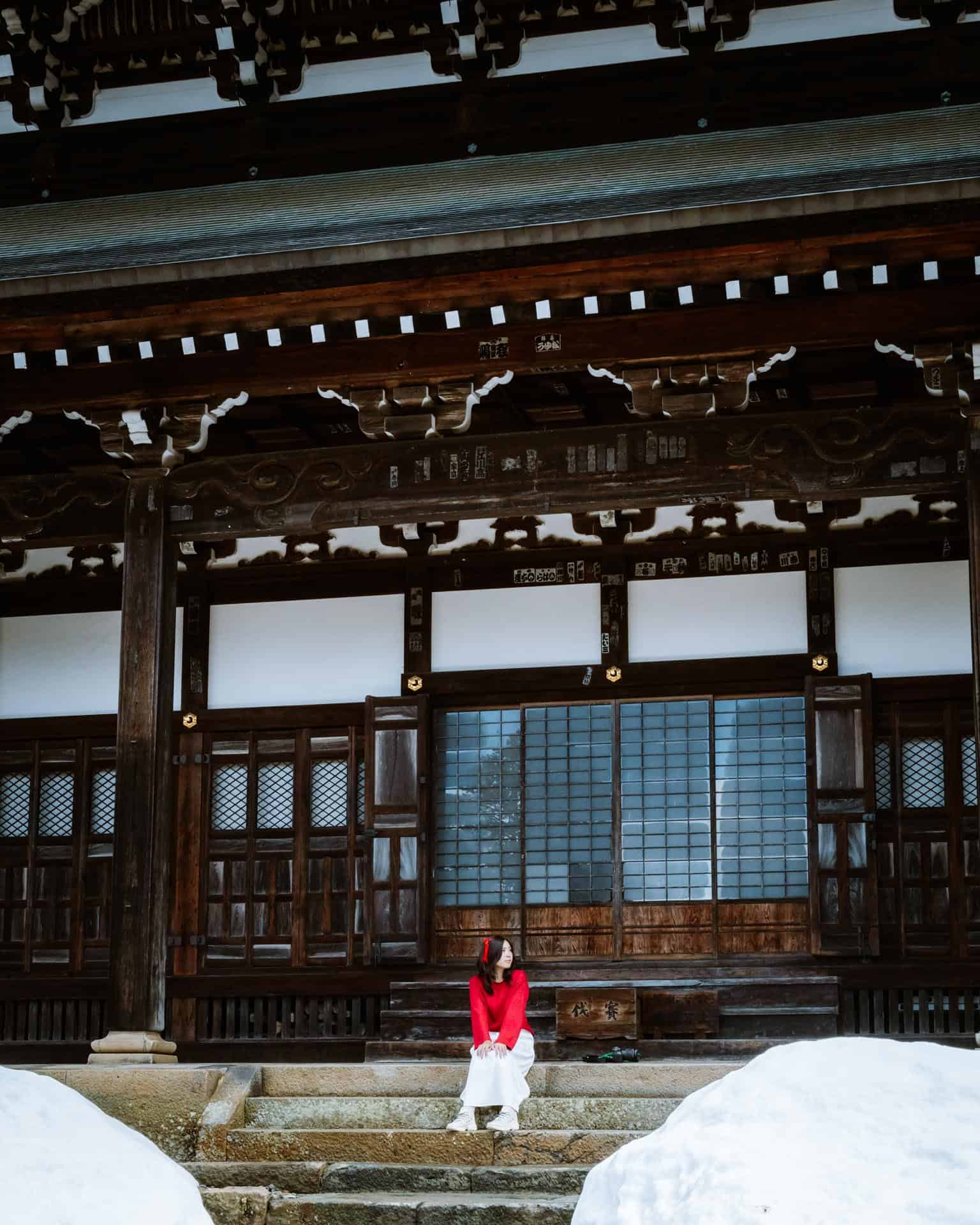
Our Free Takayama Google Maps Locations
Do you need a handy map with all our Takayama locations? We’ve got a Google Map with all the Takayama locations in this post (plus a LOT more). Sign up in the box below and we’ll deliver it right to your inbox, plus our top tips to help you plan your Takayama adventure.
Miyagawa Morning Market
When we visited the morning market, we went down to the riverside to relax while enjoying our snacks. It’s an awesome way to start the day.
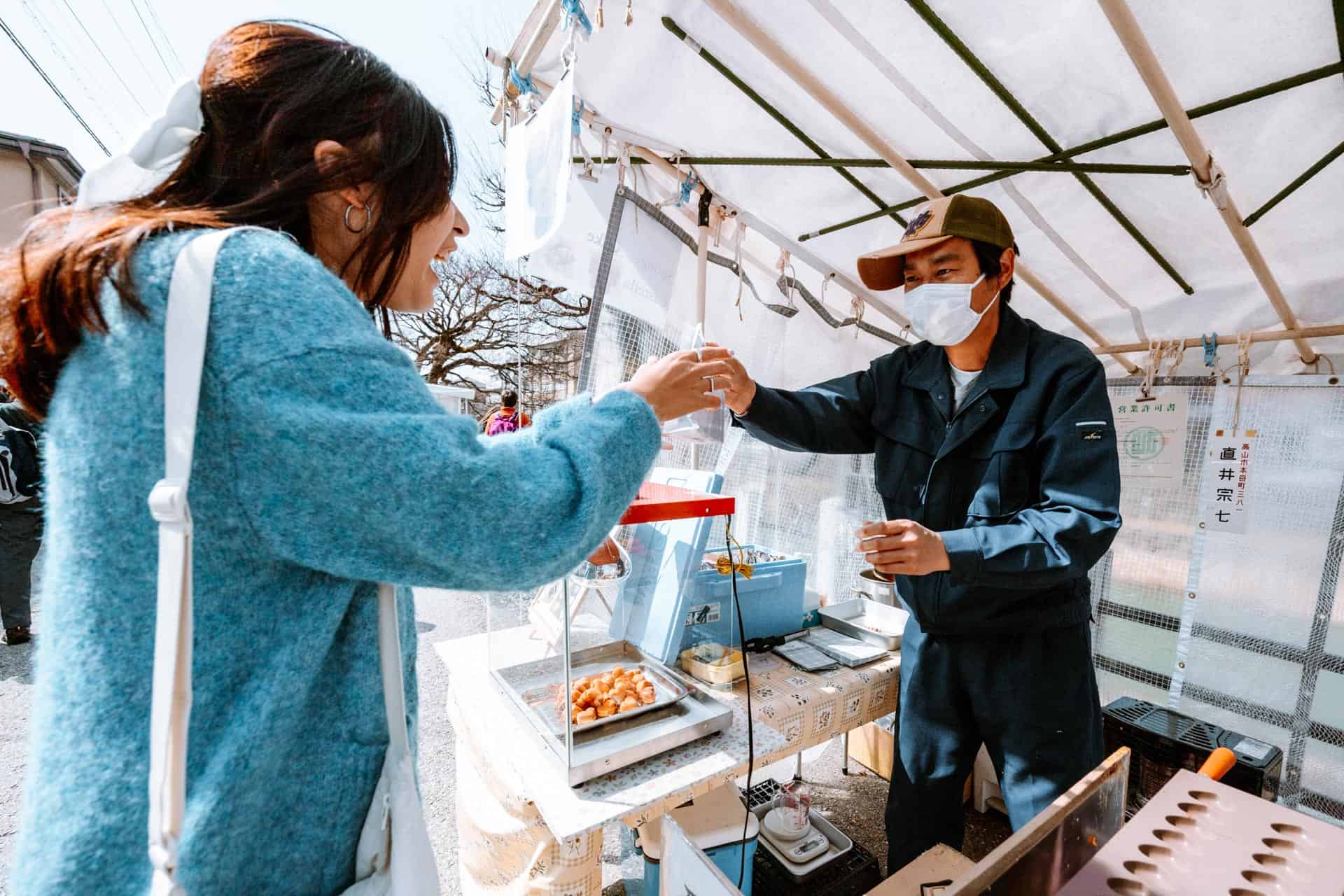
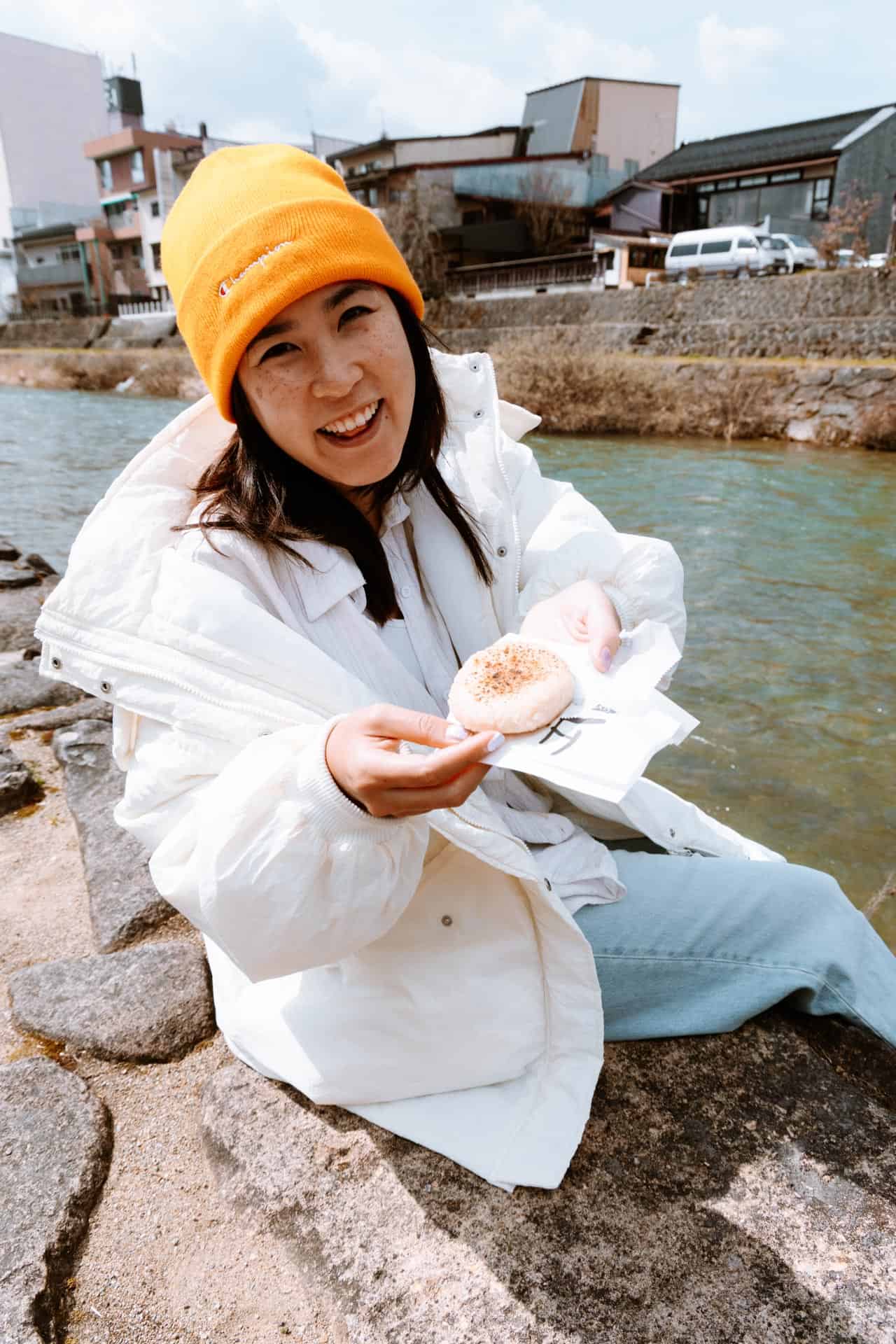

Jinya-mae Morning Market
The Jinya-mae market is a little different than the Miyagawa Market. It has more of a farmers market feel. It doesn’t have any snacks or prepared foods, instead, it is more of a traditional market where local farmers sell their produce and products.
The Jinya-mae market is located right outside of Takayama Jinya, so if both those places are on your list, you can go to the market and then head into Takayama Jinya for a tour of an Edo-period government building.
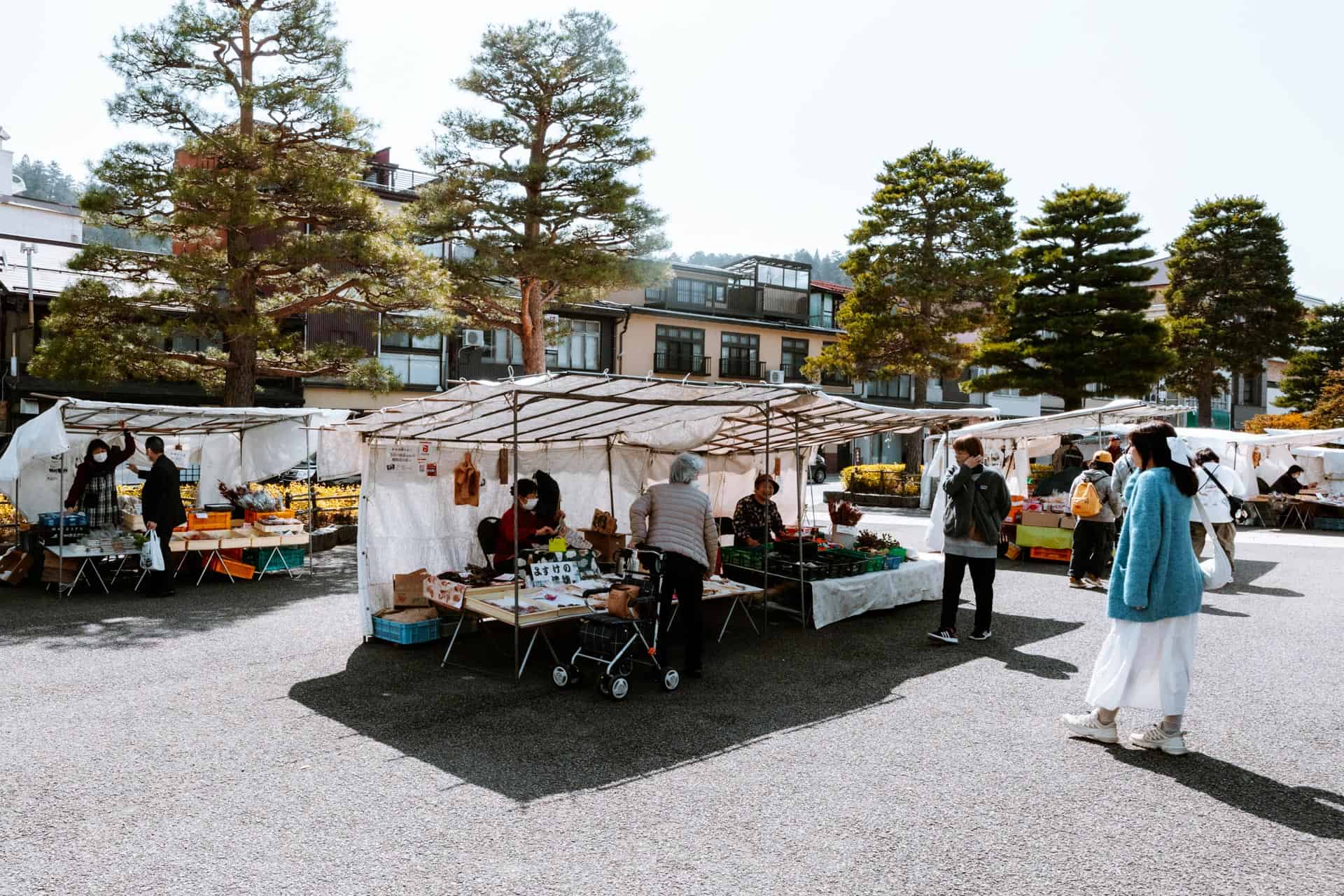
Takayama Shōwa-kan Museum
Takayama has not one, but two retro museums!
Our favorite one was the Takayama Shōwa-kan Museum.
It aims to recreate scenes from Japan’s Shōwa era. While the Showa period lasted from 1926 to 1989, the museum has a distinct 1950’s vibe.
The Showa-kan Museum has several themed rooms, including a barbershop and a doctor’s office.
The entire museum is decorated with authentic vintage items. It’s so detailed that you would need to spend an entire day there to get a good look at everything.
The best part is that photos are encouraged in the museum! We had tons of fun playing dress up in the theme rooms and taking photos and videos of ourselves.
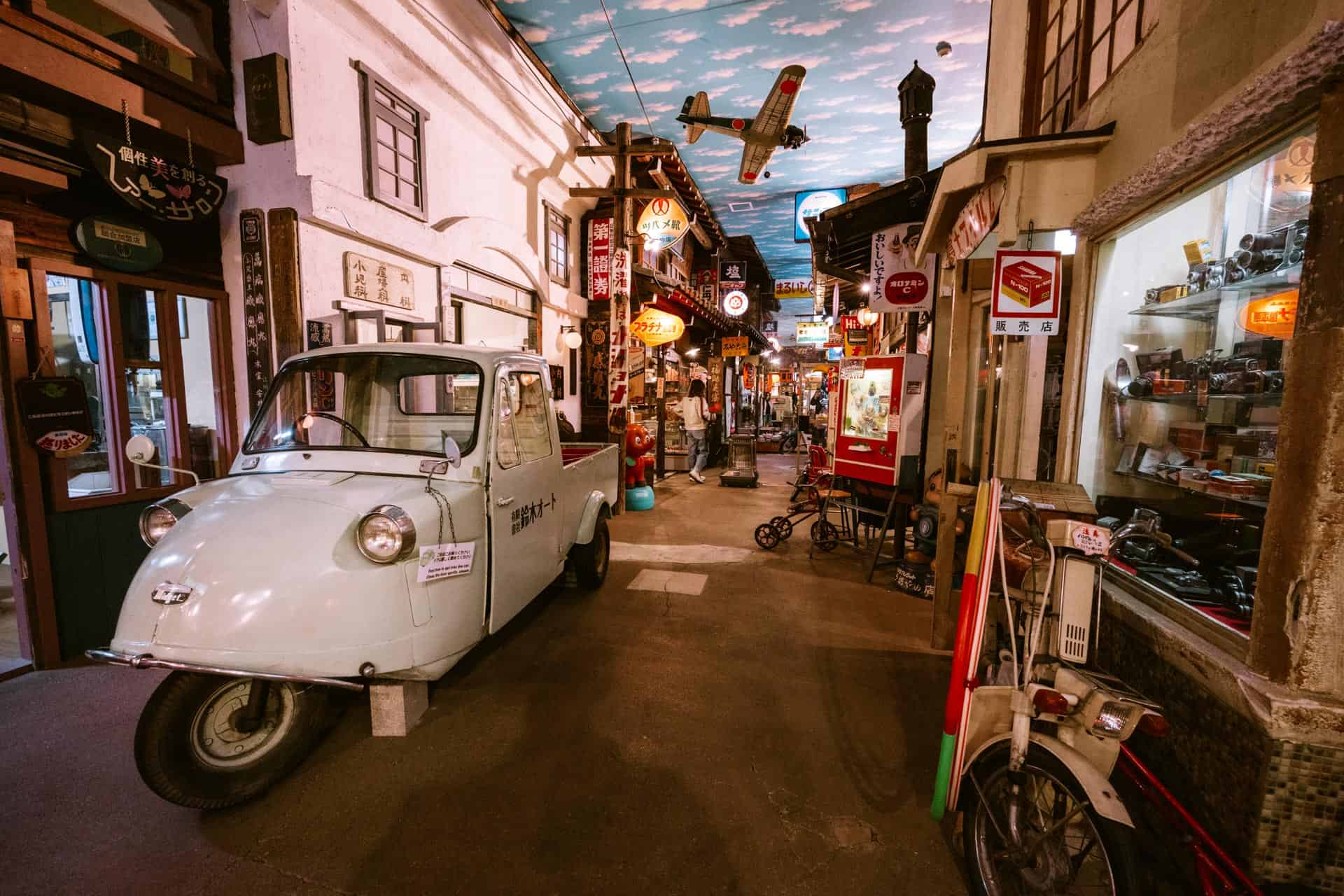
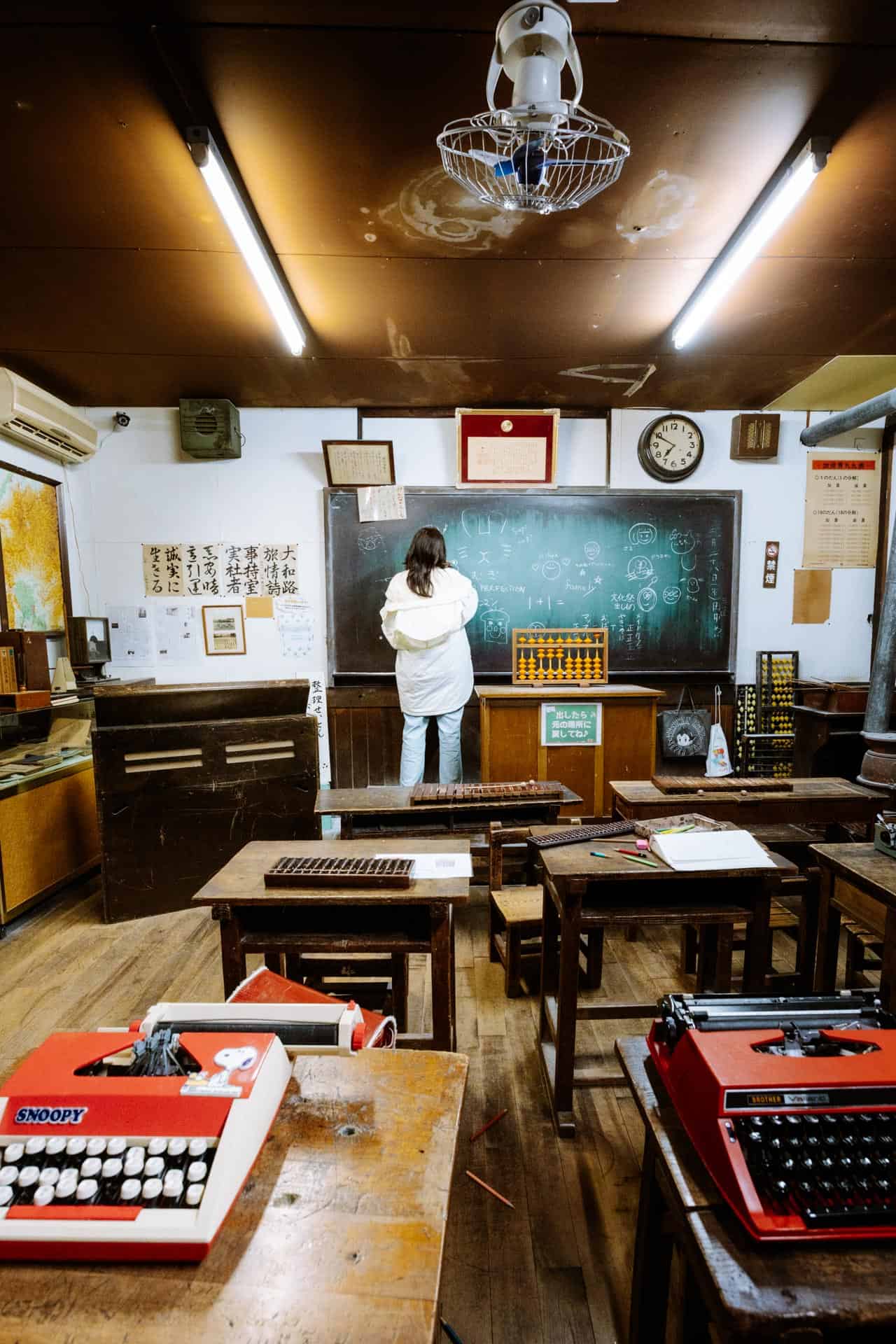
Takayama Retro Museum
The Takayama Retro Museum is more of a hands-on place. It has retro arcade games and toys everywhere.
The best part? Playing with everything in the museum is encouraged! It’s an awesome place to get lost in an old video game or pinball machine.
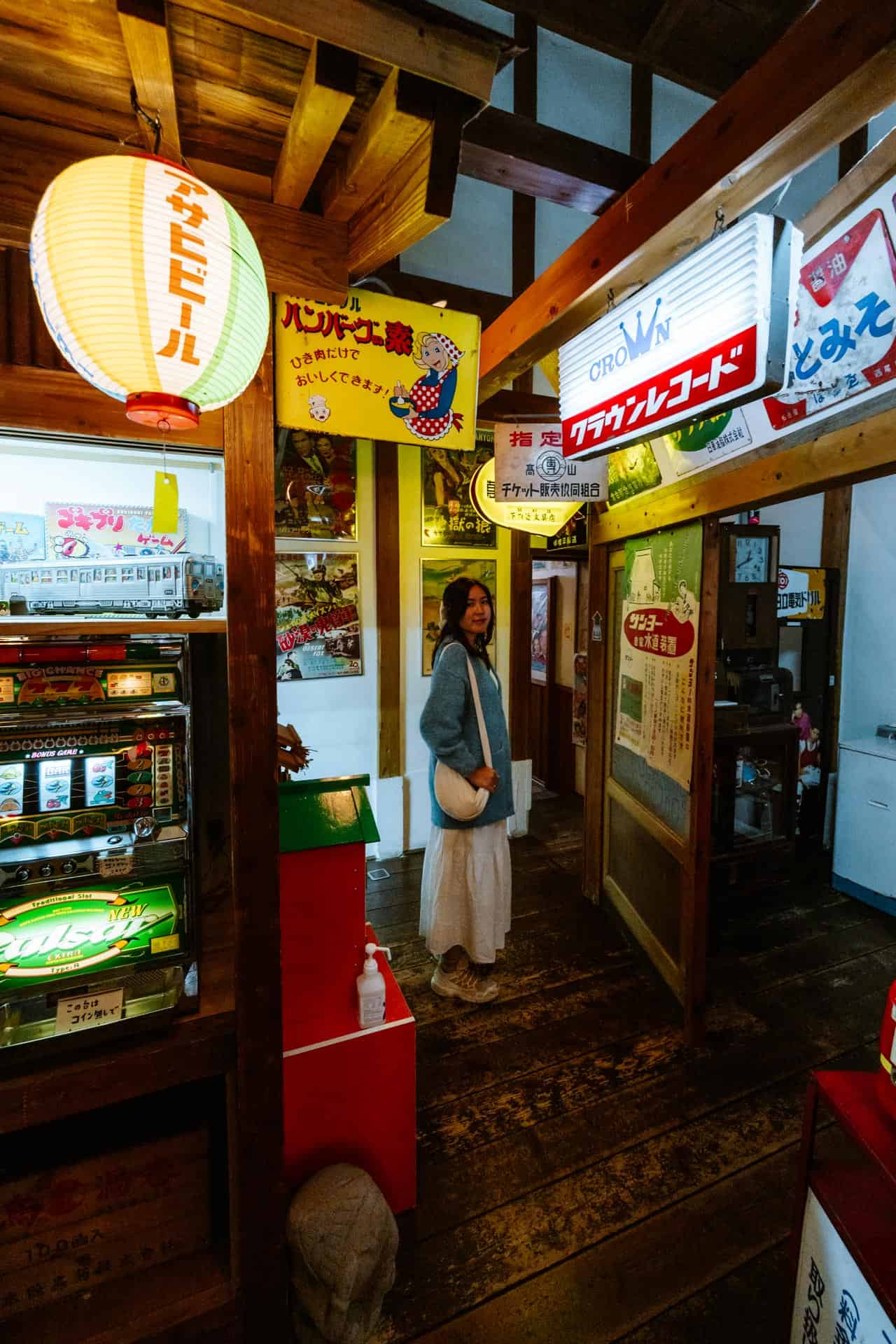
Takayama Shōwa-kan Museum Versus Takayama Retro Museum
If we had to choose only one, we would go to the Takayama Shōwa-kan Museum.
The Takayama Shōwa-kan Museum has more interactive sets, while the Takayama Retro Museum is more of a retro arcade.
The Takayama Retro Museum is a little more cramped and chaotic at times since it tends to attract families with children. But if you have children and want to take them to a fun place to play for an hour or two then the Retro Museum is a better choice.
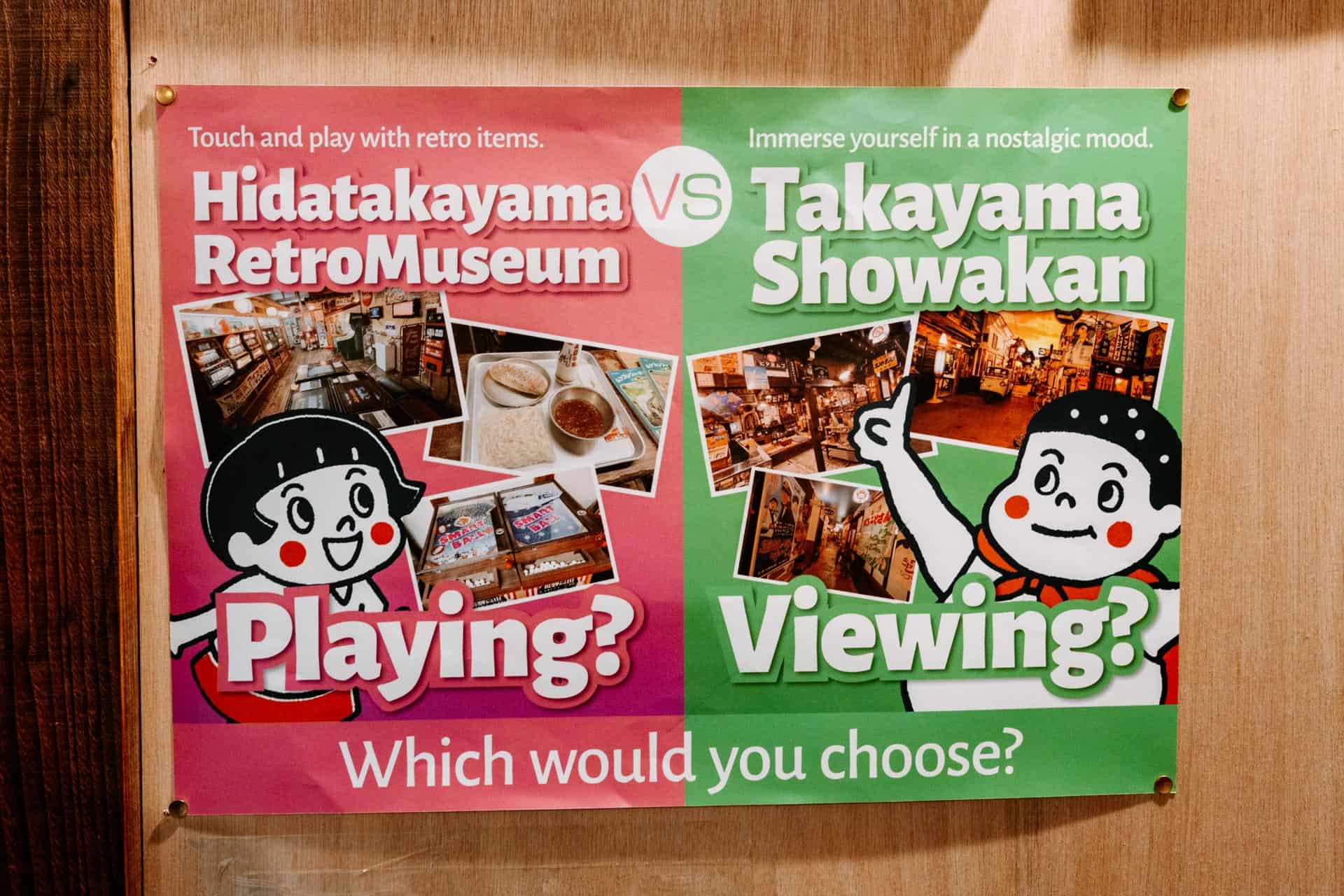
Takayama Jinya
At the heart of Takayama Jinya is a Japanese garden that adds to the peaceful ambiance. Inside, you can explore tatami-floored offices, meeting rooms, and even an interrogation room that was used in the Edo period.
Walking through Takayama Jinya provides a firsthand look at how a castle town’s government operated. The building has been preserved to reflect its original state, with a few artistic additions to help illustrate life in that era.
Read our full blog post: Takayama Jinya: Complete Guide


Takayama Festival
We are a bit obsessed with Takayama if you can’t tell already. So much so, that we visited it for a third time just to attend Takayama Festival!
Takayama Festival dates back to the late 1500s and consists of two distinct festivals: one in spring, and another in autumn.
One of the main characteristics of the Takayama Festival is the highly decorated floats that parade around town. During the spring festival, 12 floats parade around the city, while the autumn festival has 11 of its own floats.
Some of the floats from the Takayama Festival are on display year-round! The Takayama Matsuri Yatai Kaikan museum displays four floats used in the autumn Takayama Festival.
People from all over Japan come to Takayama for the festival. We met a friendly Japanese couple who drove from Hiroshima to attend the festival.
When the sun sets, the floats parade around the town with lanterns. Each float has a few dozen lanterns that are unique to that float.
Something that caught me by surprise was that even though these floats were ten times older than anyone in the parade, they were still sturdy enough to carry people in them!
Children sat on the tops of the floats, waving and smiling at everyone. Chloe was so jealous – she’s never been carried around in a float!
Read our full blog post: Takayama Festival: Our Complete Guide
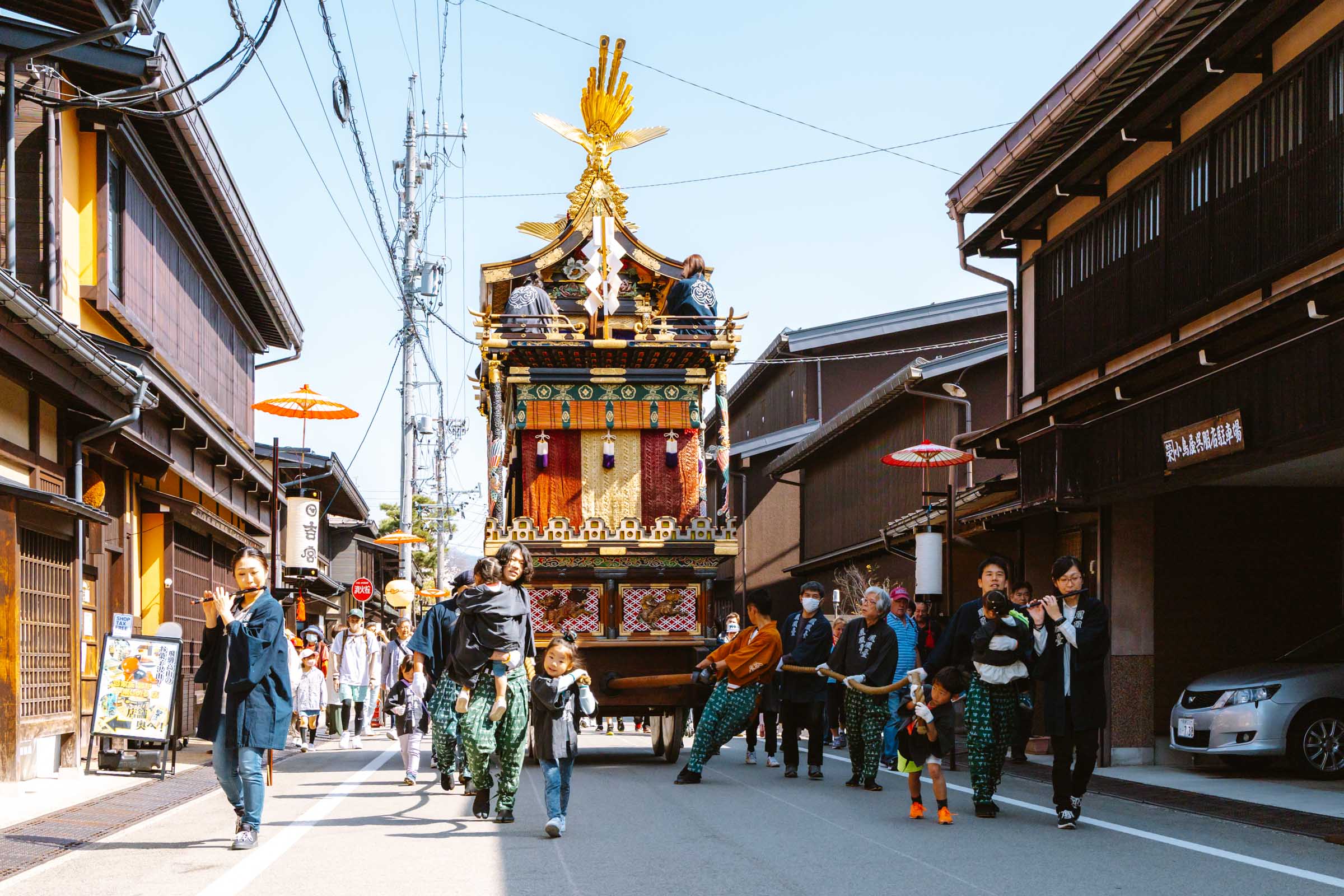


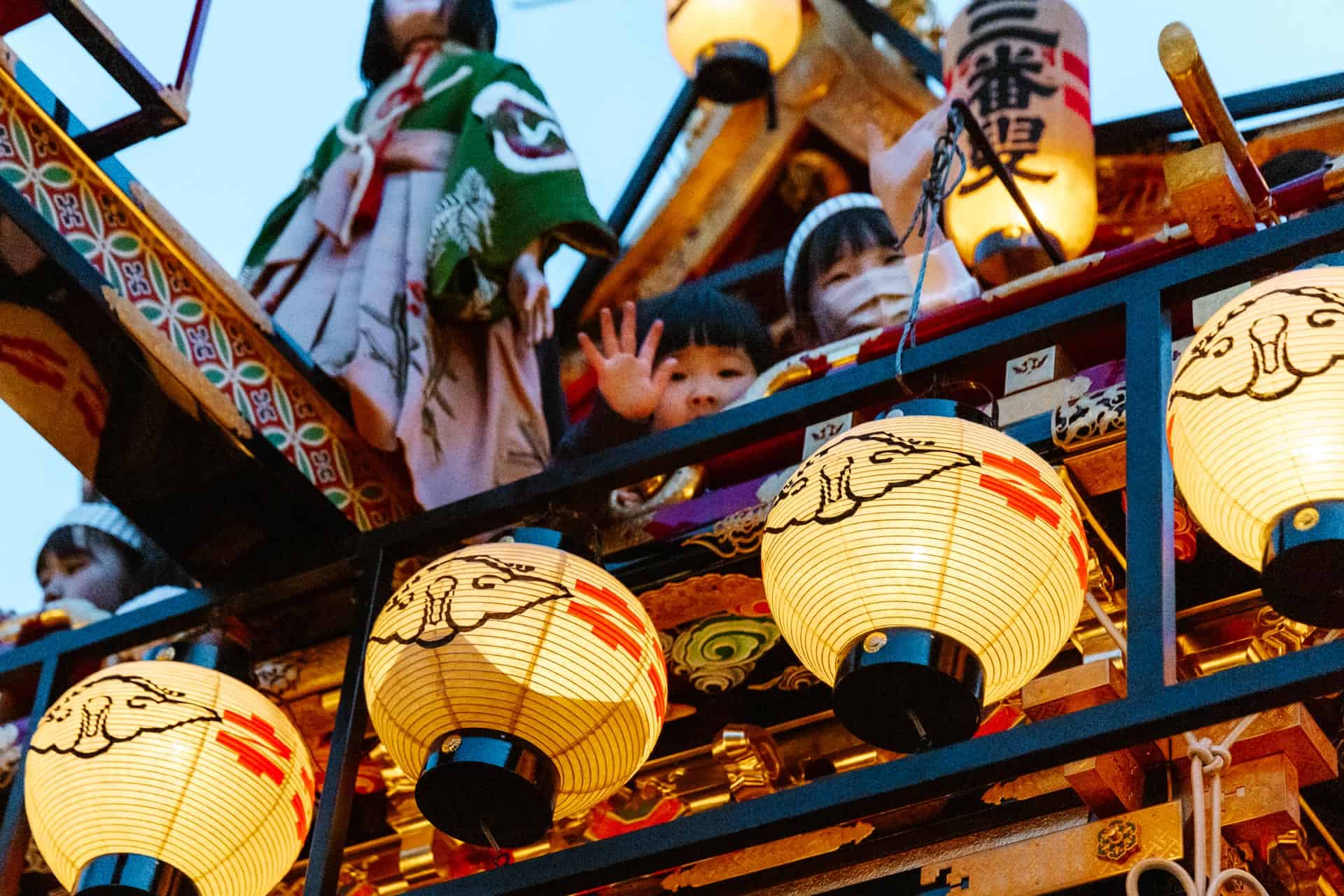
Takayama Castle Ruins
A fun little adventure right in Takayama is the hike up to Shiroyama mountain to see the Takayama Castle Ruins. The only remains of the castle are some of its stone foundations.
However, if you walk up to the castle ruins you will see an epic view of the Japanese Alps, so it’s still worth the trip up there.
And if you are fortunate – you may come across Japan’s wild good luck charm – the Kamoshika.
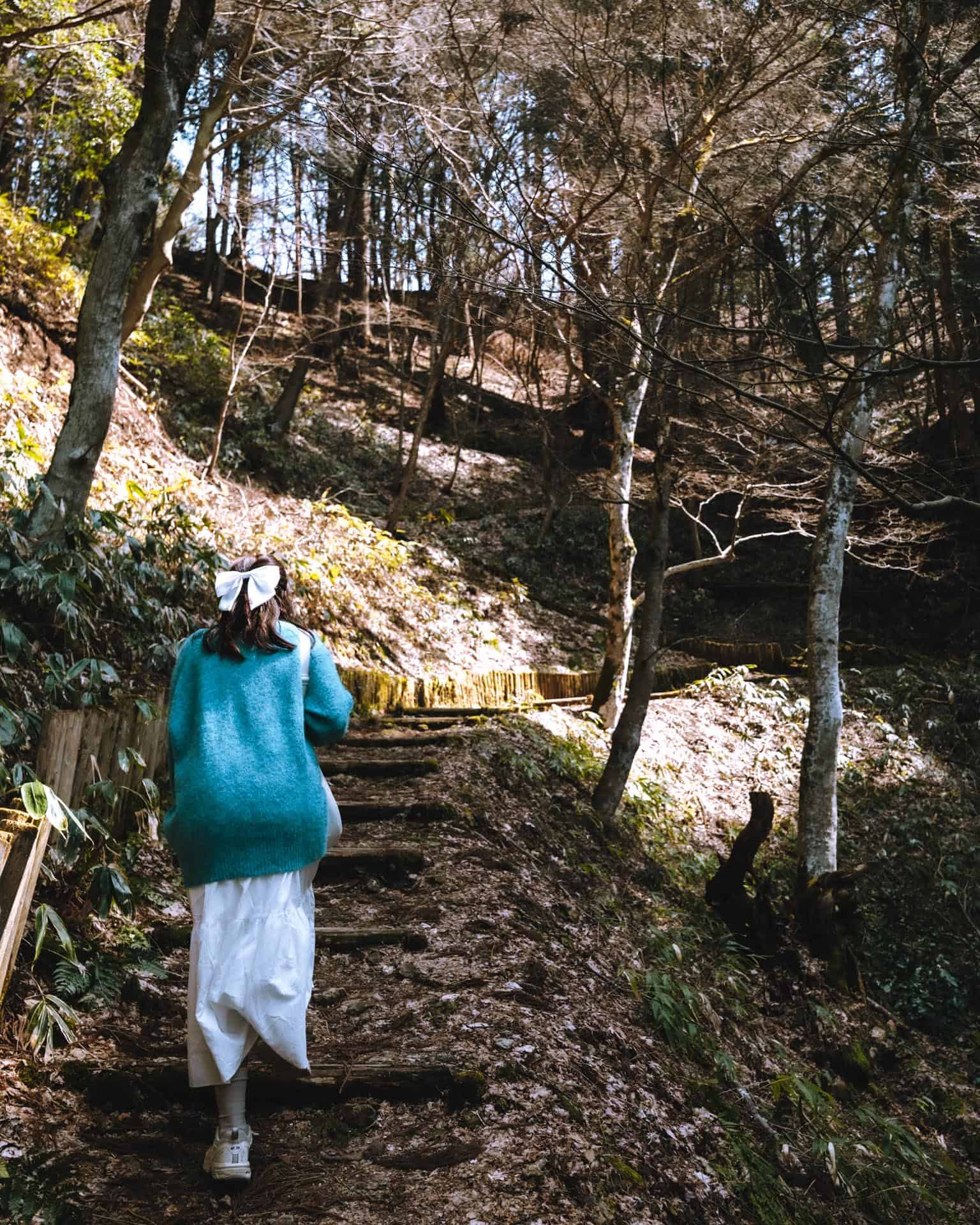
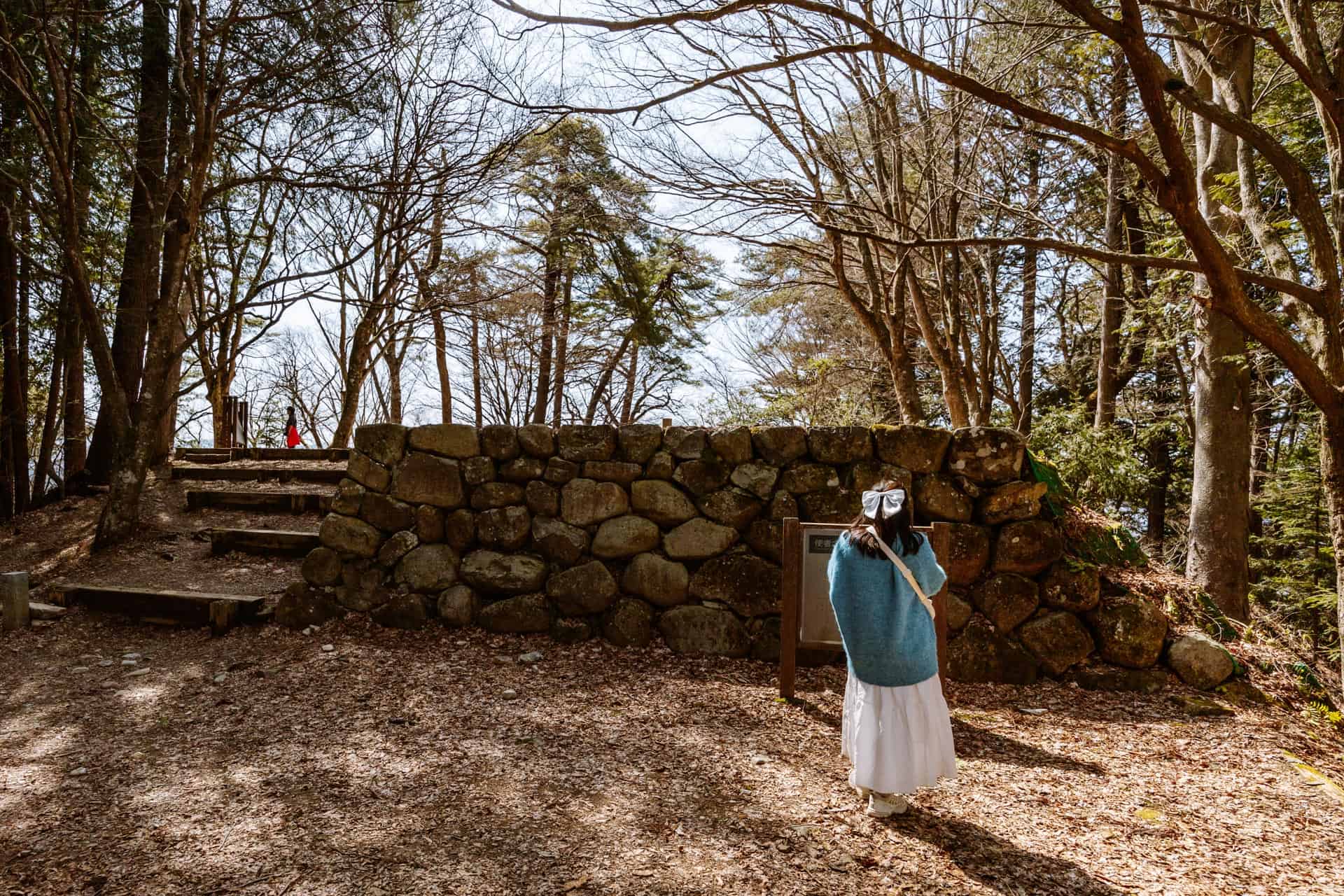
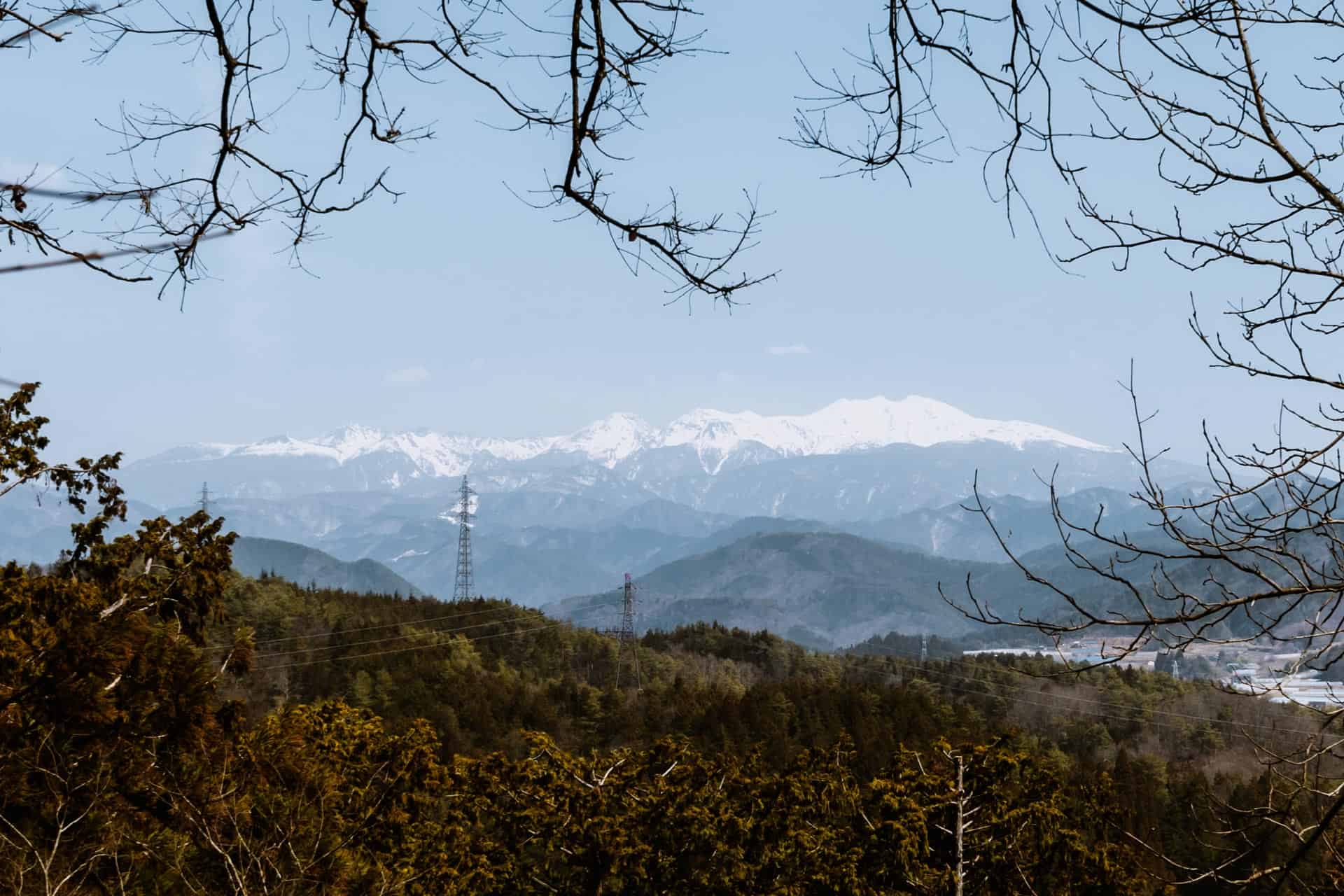
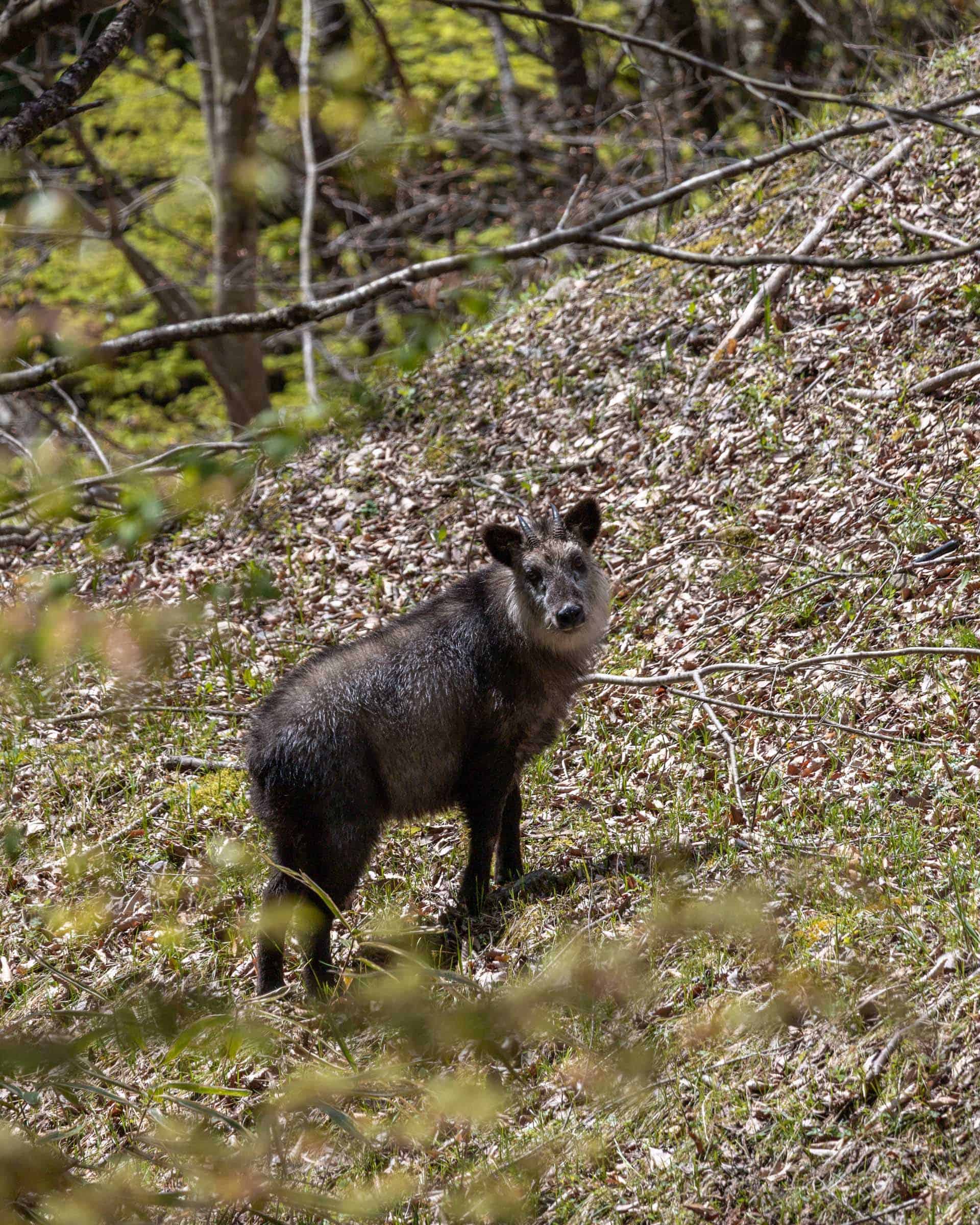
Shiroyama Park
Shiroyama Park is within walking distance of Takayama’s old town and has an awesome view of the city. The park has a large field, a small store, clean restrooms, and a children’s playtoy. We came through this park once to overnight in our campervan and another time to hike to the Takayama Castle Ruins.
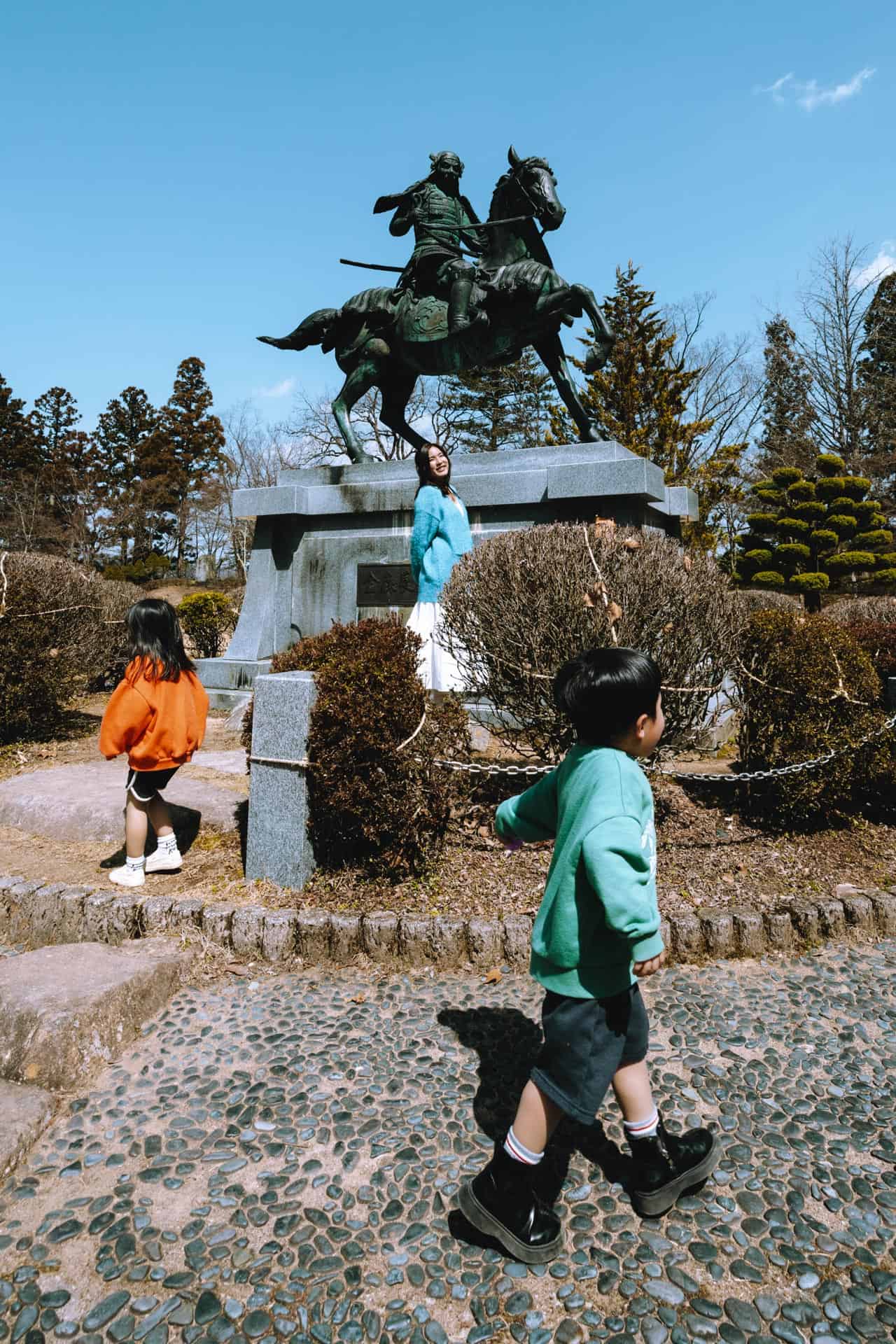
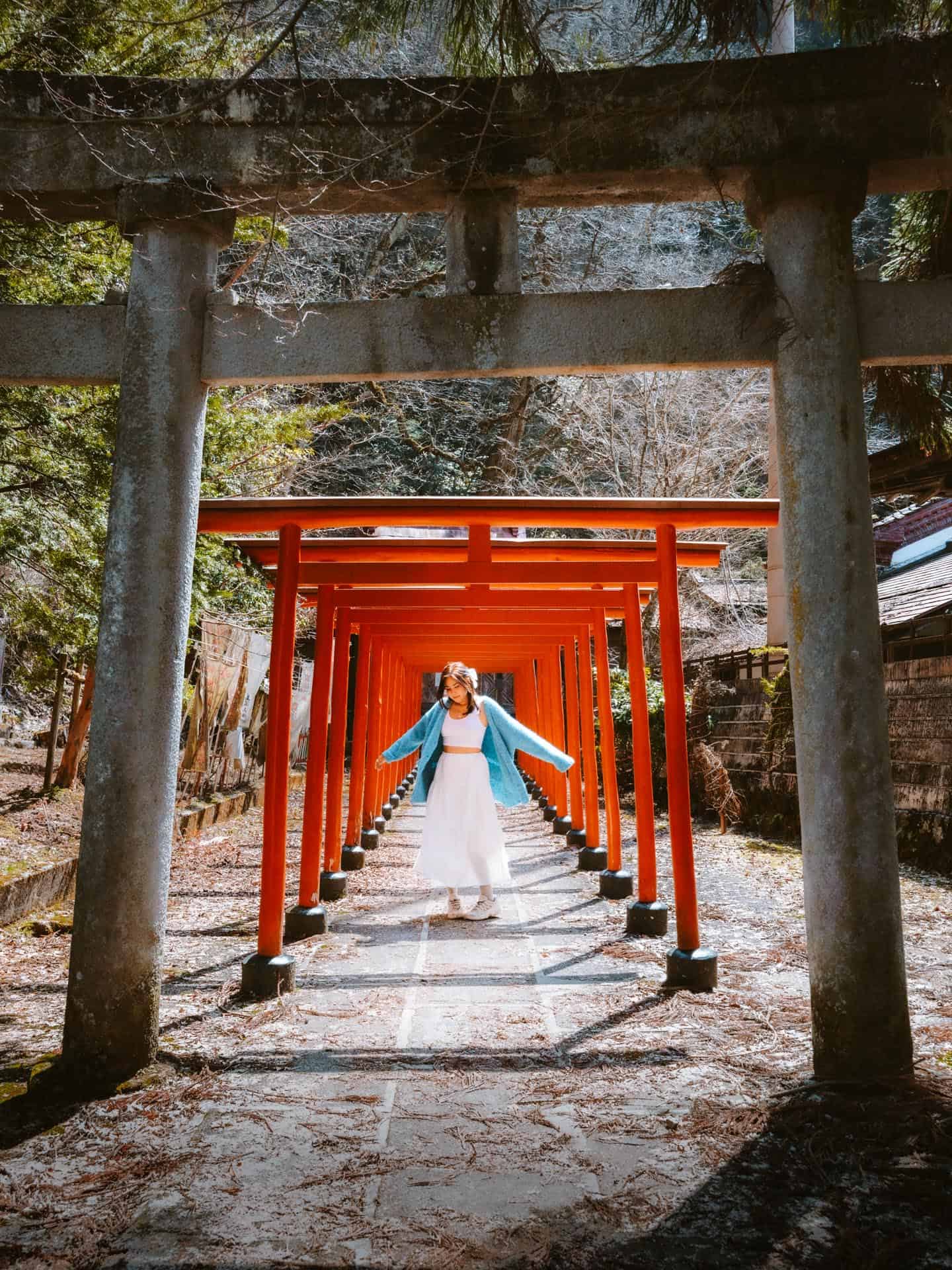
Kitayama Park
We visited this park because we had extra time on our hands and thought: Why not! Going to Kitayama Park is an awesome way to escape the business of Takayama’s Old Town.
The walk to the park is a relaxing stroll up a hill, through a neighborhood, and up a road with some small-scale farming.
The park has an awesome view of the city, a cemetery, and a small children’s playtoy. There is also a cafe which we tried to visit but were told was closed for an event.
Overall, Kitayama Park is something we would not visit again, but it was a relaxing way to escape the normal tourist path in Takayama. If you feel like visiting a park in Takayama, we recommend Shiroyama Park instead.
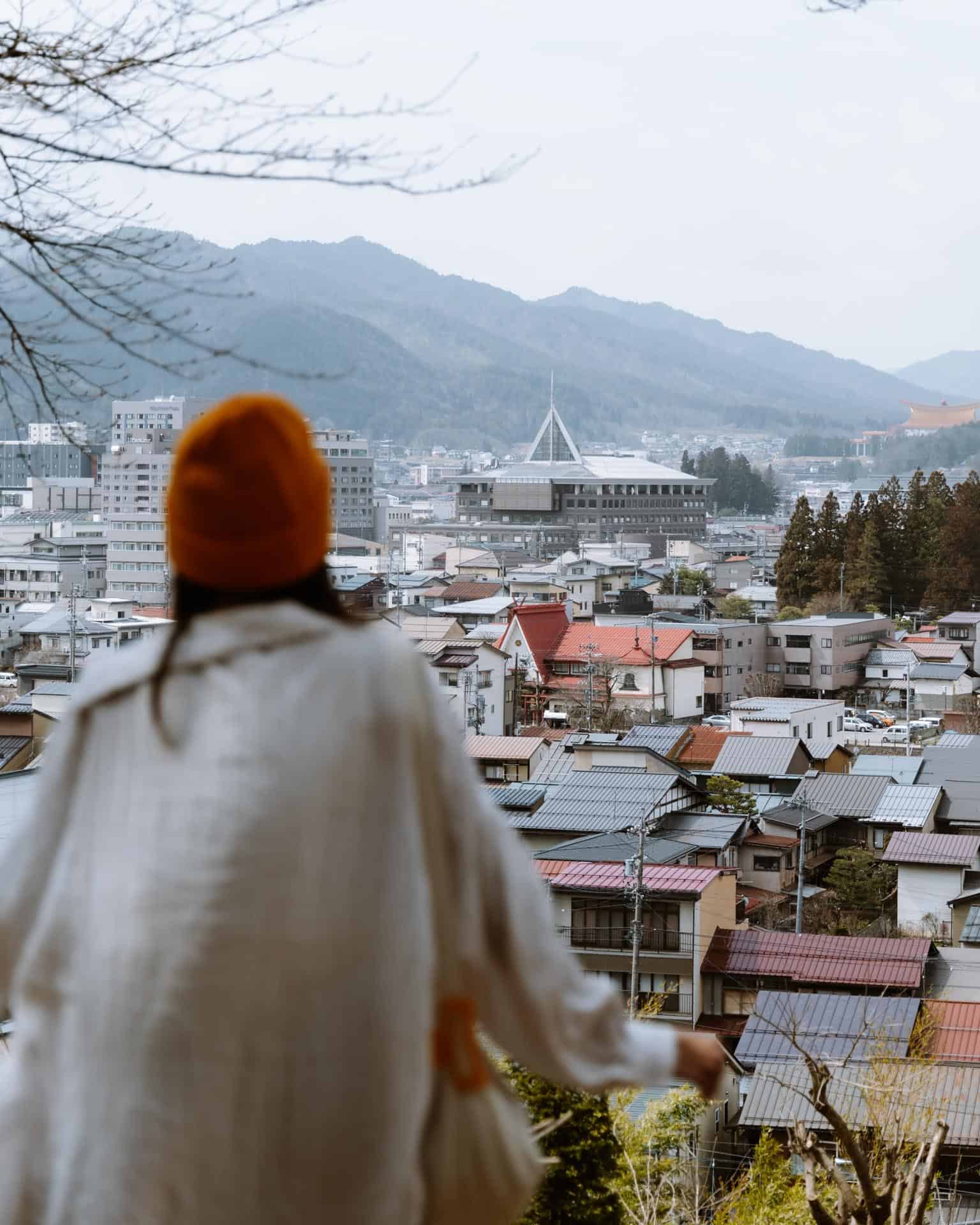
Kusakabe Traditional House
Takayama’s traditional houses are beautifully preserved in the Homeitaigumi district. Today, the Yoshijima and Kusakabe houses give you an idea of what life was like for wealthy Edo-era merchant families.
We visited the Kusakabe House just before its closing time. Going before closing worked in our favor since we enjoyed the architecture and scenery quietly.
The Kusakabe House itself is impressive. It has huge tall wooden beams from old-growth trees and an interesting family history.
The Kusakabe House also had a show where a local storyteller was singing songs and telling stories.
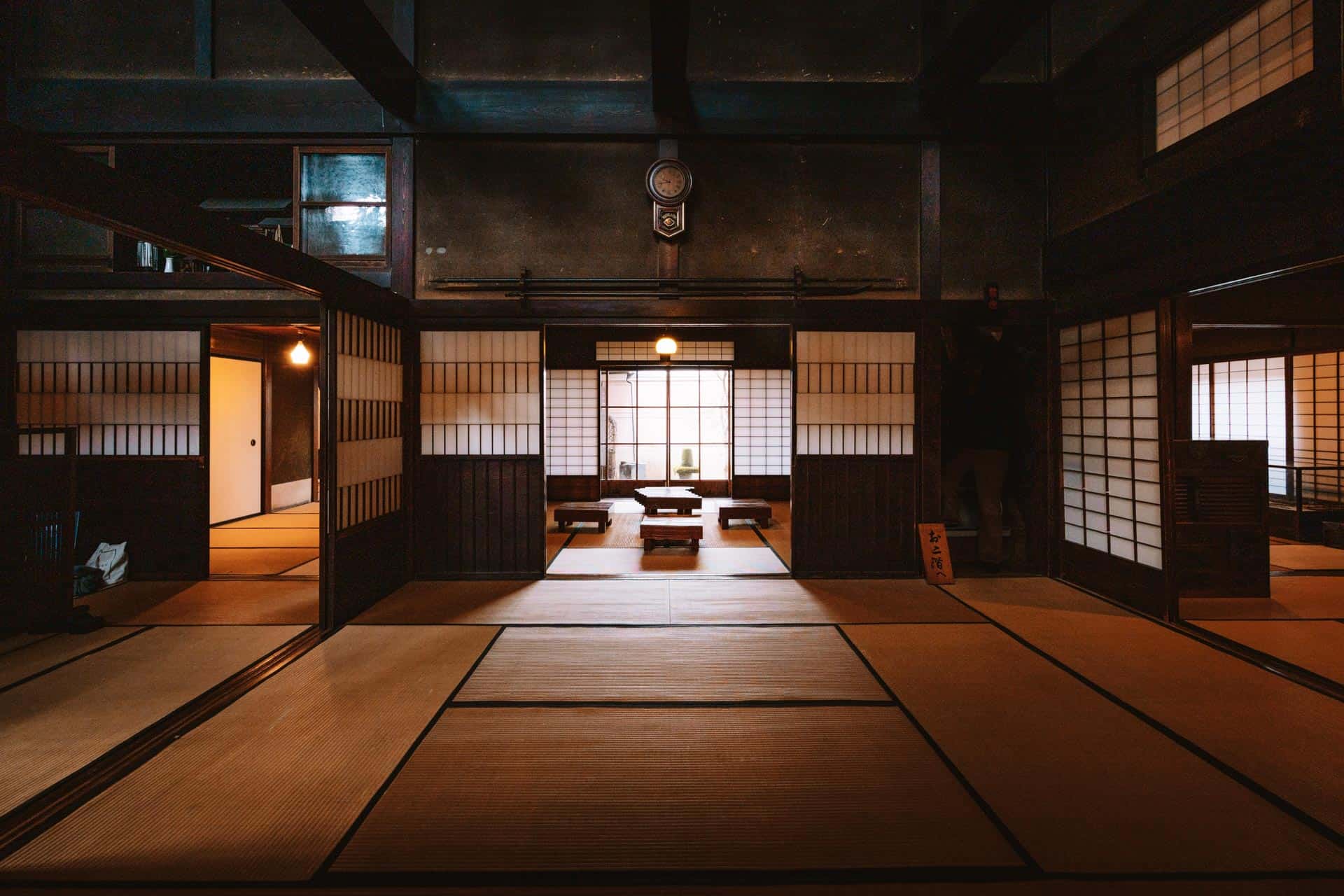
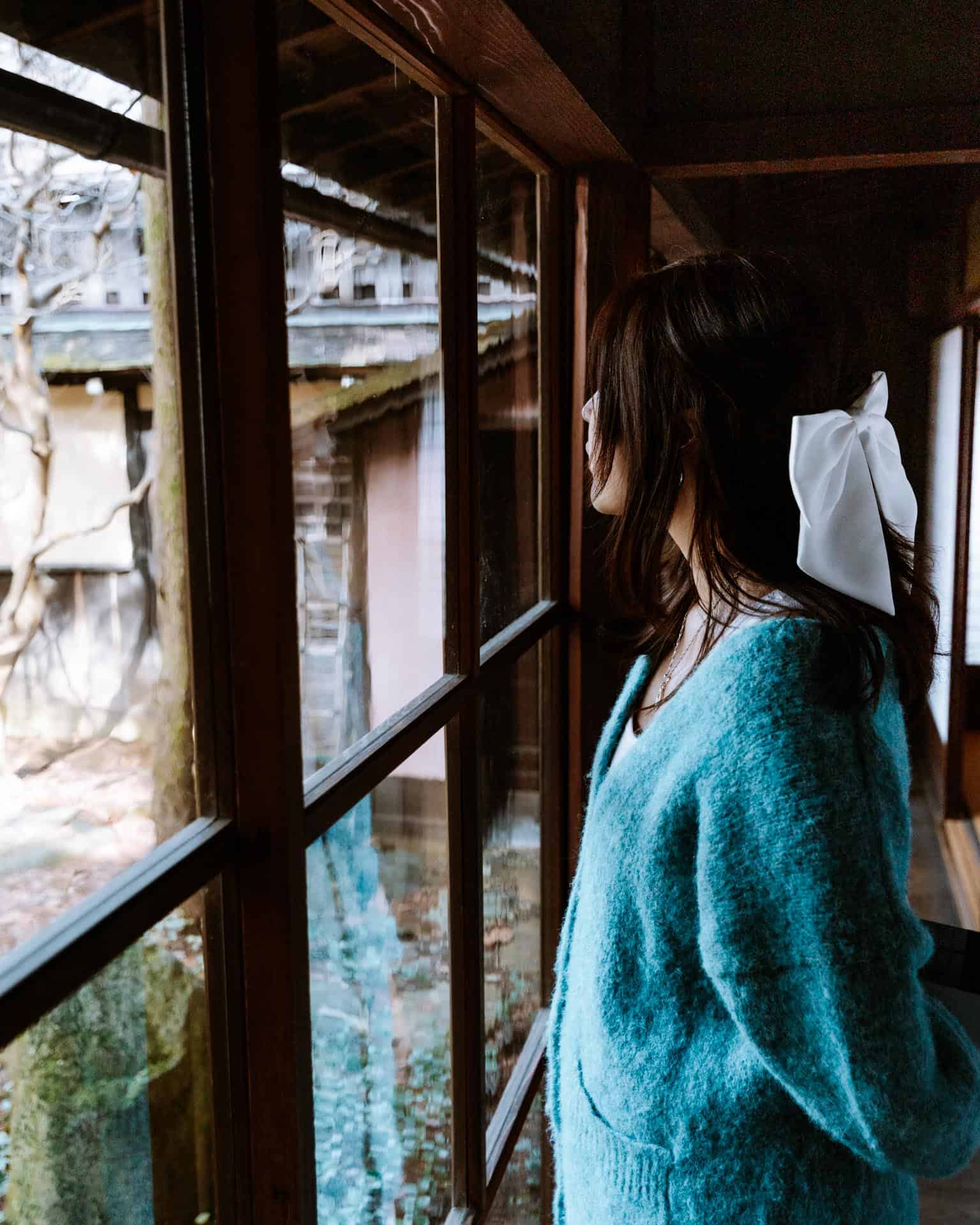
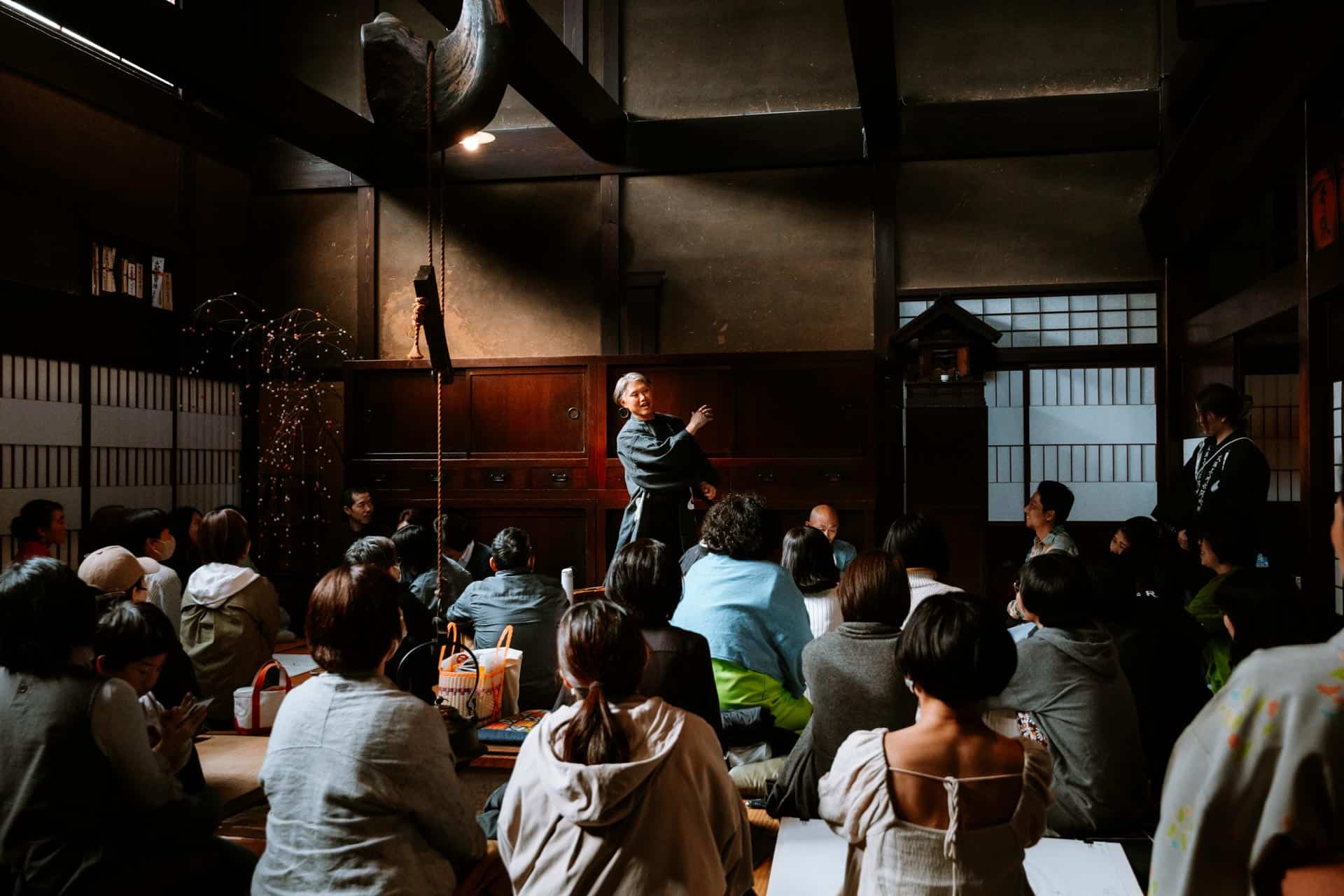
Teddy Bear Eco Village
The Teddy Bear Eco Village is a place where creativity meets nostalgia. The museum leads you through playful teddy bear exhibits, giving “teddy life” to everyday scenes. Some are walking down the street, others are ‘fishing’ by a pond, and a few are even dressed up in traditional Japanese garb.
When Chloe and I first walked in, we couldn’t help but giggle. It’s such an unexpected blend of the serene Takayama surroundings with the playful charm of teddy bears.
And the ‘eco’ in Teddy Bear Eco Village represents its sustainability efforts. Many of the installations and displays are crafted using recycled materials.
Read our full blog post: Teddy Bear Eco Village in Takayama: Complete Guide
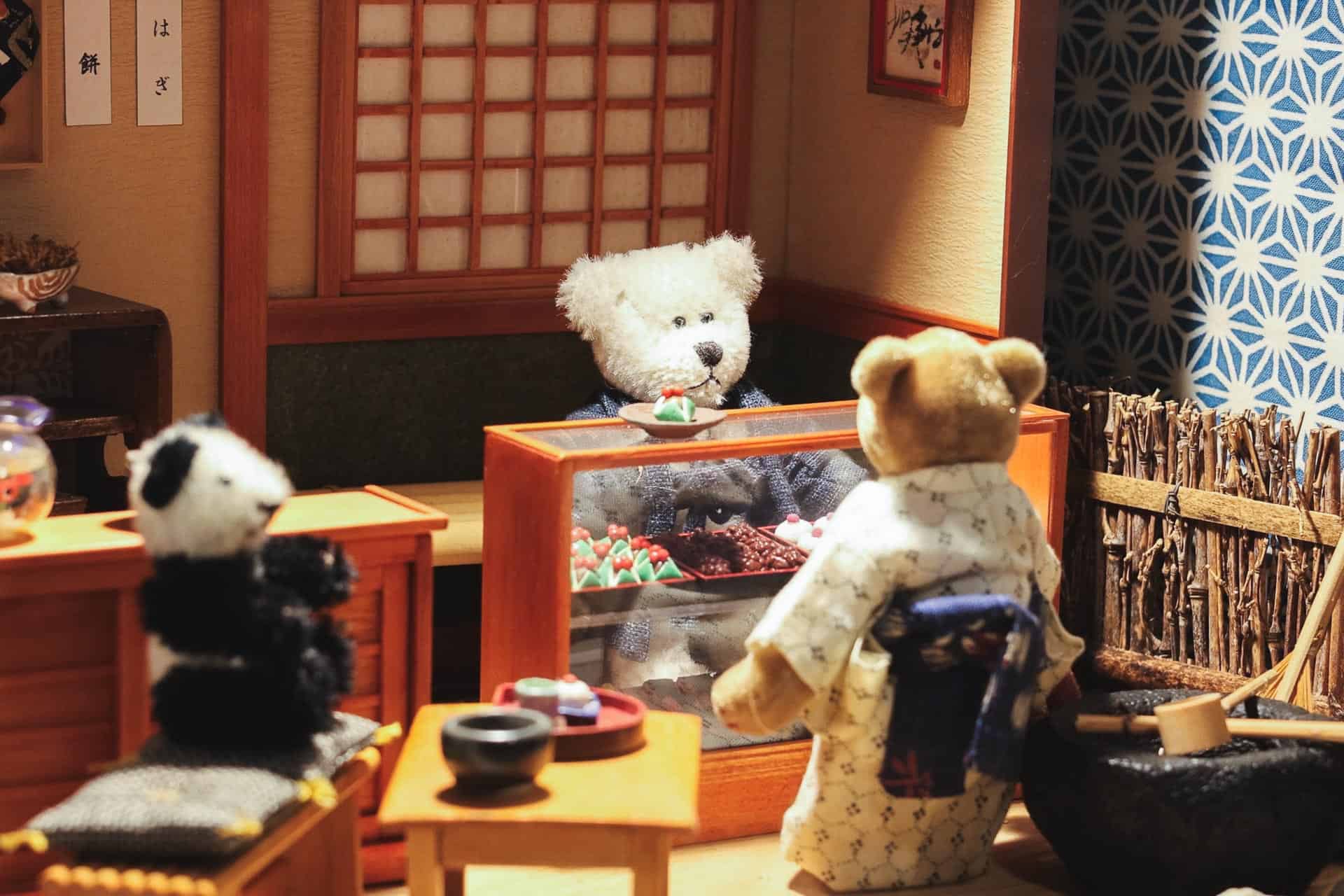
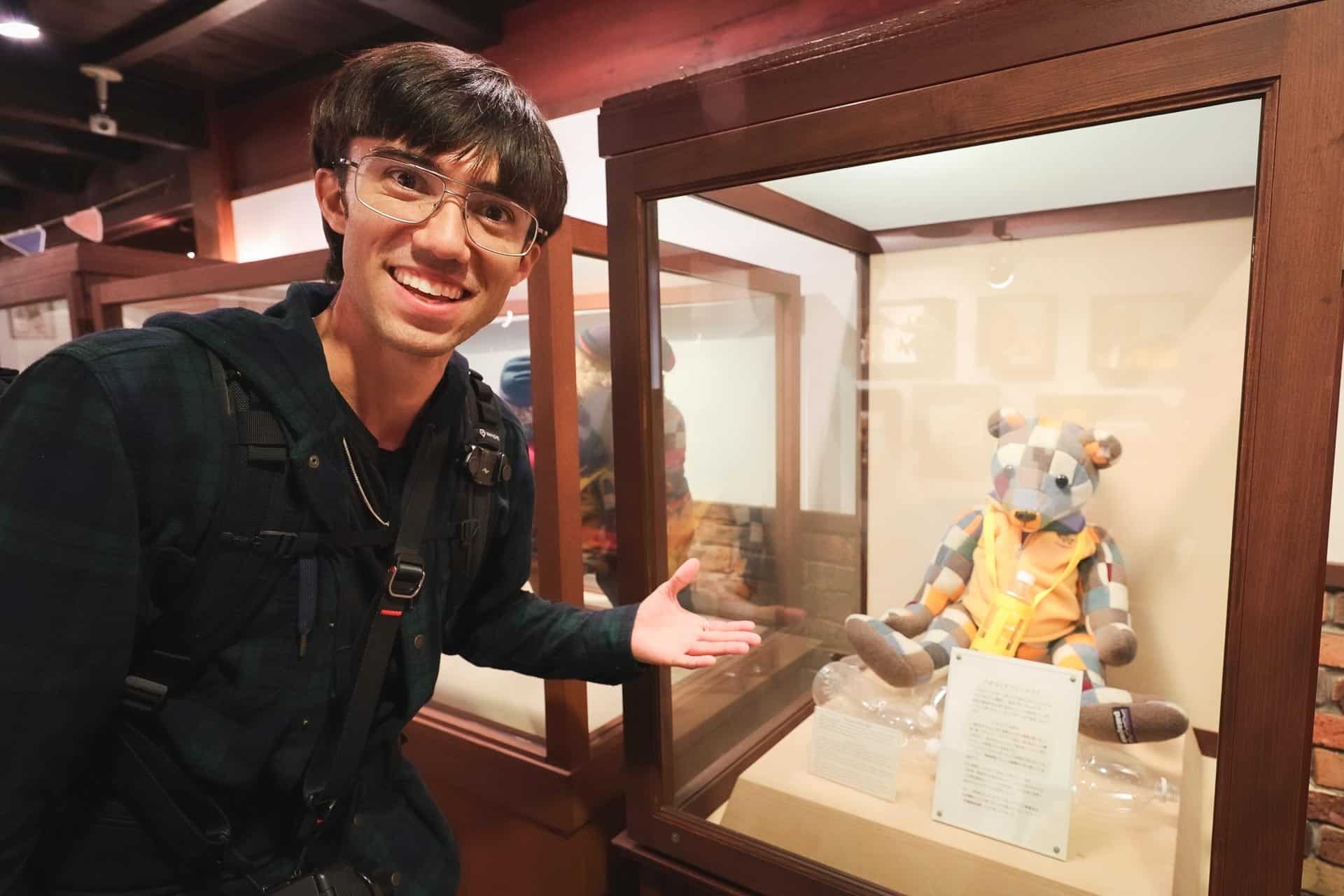
Relax in an Onsen
With Takayama’s proximity to the Japan Alps comes a huge array of onsen options.
The onsens near Takayama get their hot spring water directly from the earth. The hot water is full of minerals that are thought to possess properties that are beneficial to your health.
There are other onsen options at the Hirayu rest stop. If you ride the bus to Takayama from Tokyo, the bus actually stops in Hirayu.
We went to Hirayu-no-mori which is a traditional style onsen – with over 7 outdoor pools full of sulphuric water. There is also a cold plunge.
We enjoyed this onsen more than the private onsens we’ve been to. There is something just so nice about bathing outdoors in the mountains with all the elements hitting your skin. You have to be comfortable being nude in public and an important note – tattoos are forbidden (as with most public onsens).
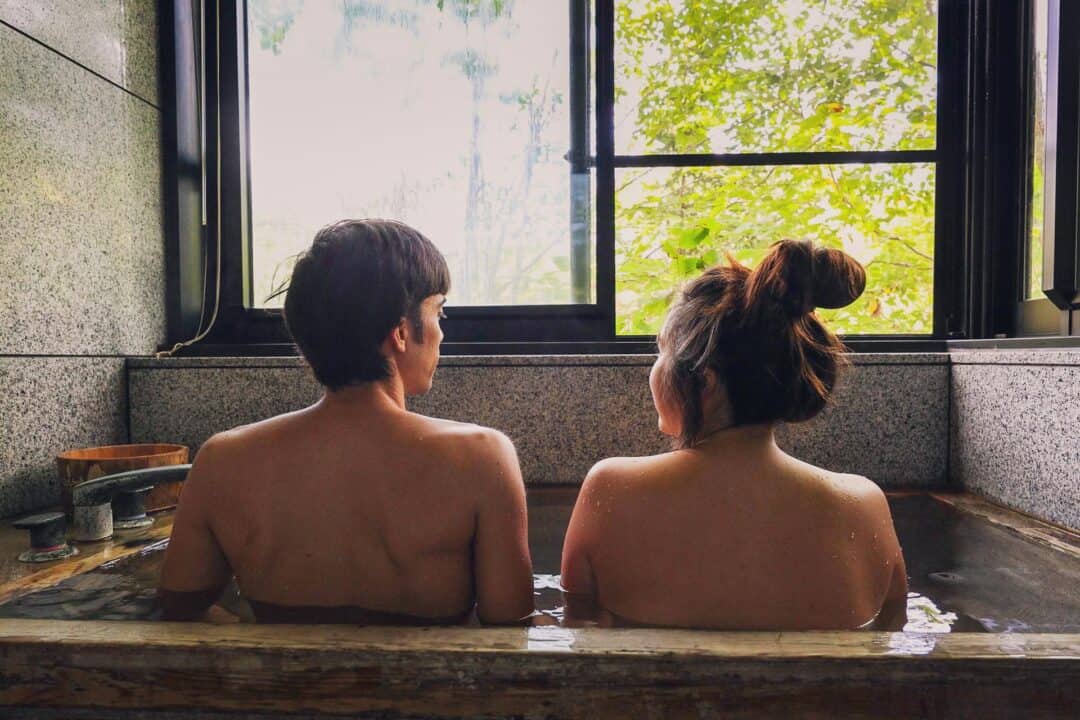
What to Eat in Takayama
With its status as a touristic town, Takayama has tons of dining options.
The awesome thing about dining in Takayama is that most of the restaurant staff speak enough English, so going out for a nice dinner in Takayama is much less intimidating than say, Tokyo for instance.
Here are some of our food and restaurant recommendations in Takayama:
Hida Beef
When you first arrive in Takayama, you won’t be able to go anywhere without seeing signs for the region’s famous food – Hida beef.
Unlike other beef varieties, what sets Hida Beef apart is its intricate marbling and buttery softness that seems to dissolve the moment it touches your tongue.
Many places in Takayama serve Hida beef in one form or another. There are street vendors selling Hida beef skewers, and restaurants selling Hida beef rice bowls. Even the grocery stores sell raw Hida beef!
Our first time eating Hida Beef was at the casual Hida Beef Baya. You can order from a little window along the street and sit inside or outside.
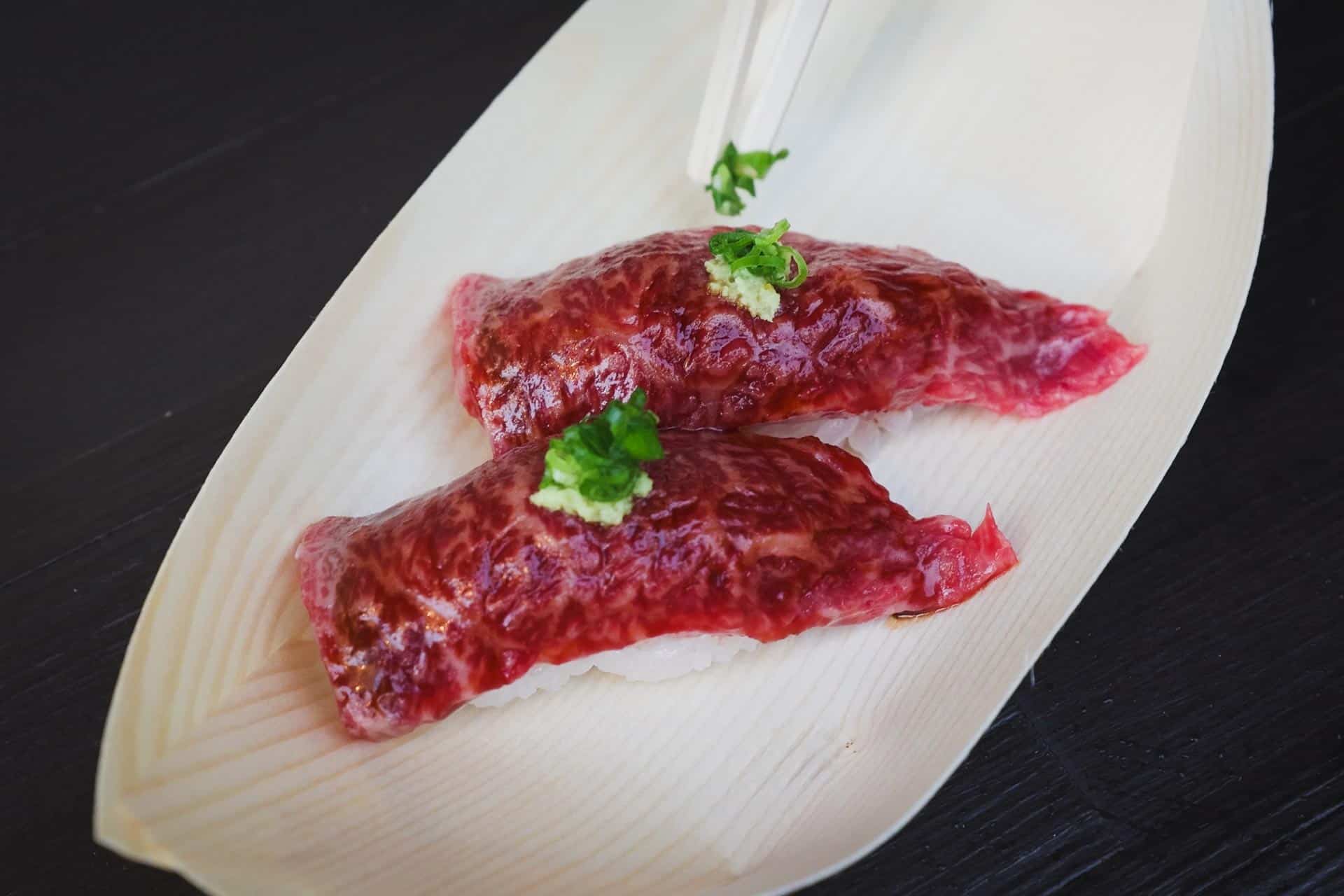
Taking that first bite of the Hida beef nigiri was nothing short of a revelation. I’m not one for raw beef, but eating raw Hida beef was like eating sashimi.
On our most recent visit to Takayama, we visited Kyoshi and ate a Hida beef rice bowl set.
We prefer cooked hida beef over raw. The cooked form has tons of flavor and still melts in your mouth. However, we recommend giving both styles a try for yourself.
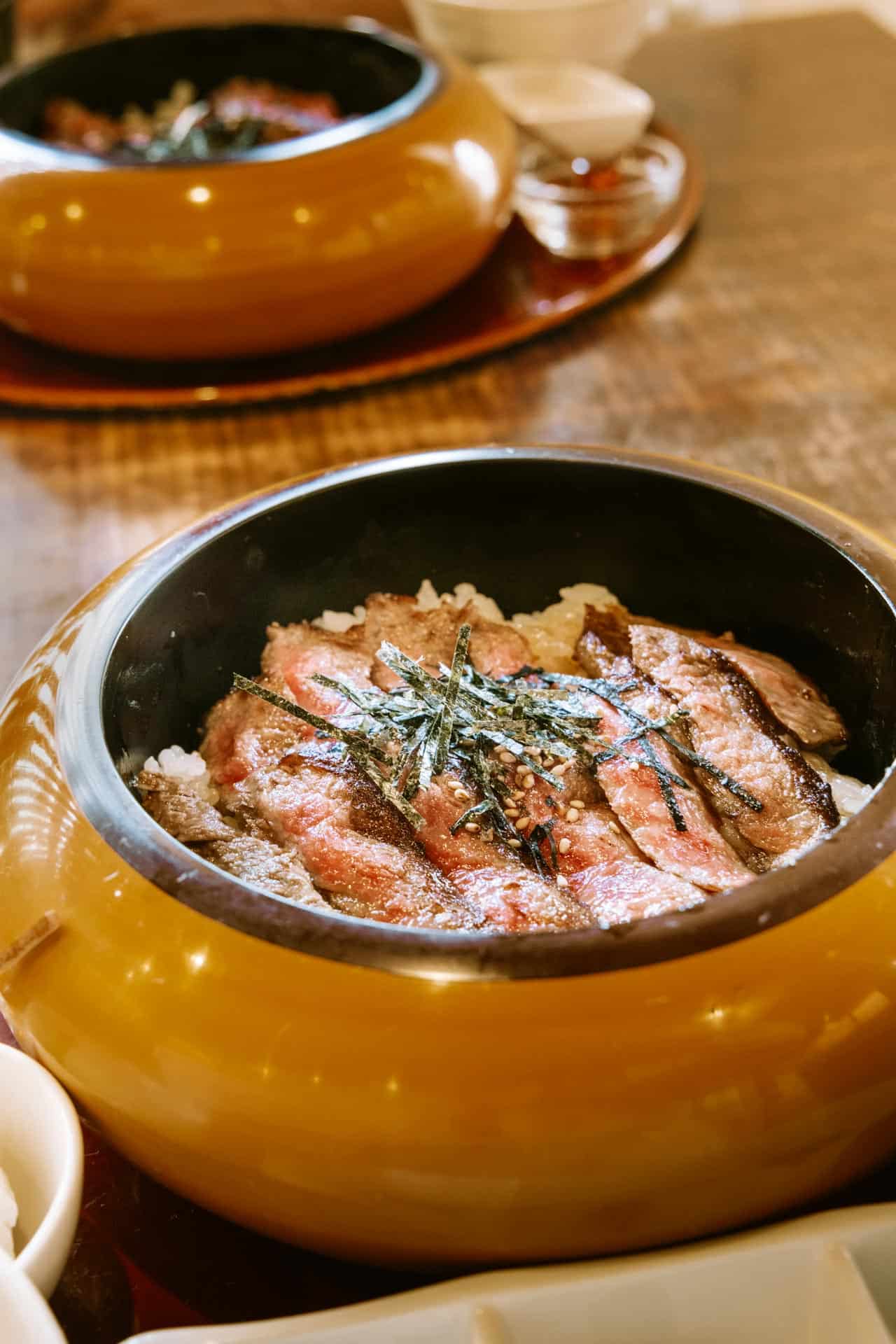
Takayama Ramen
Takayama Ramen is a light but flavorful ramen with soy sauce-based broth and thin curly soba noodles. The broth is made by boiling water with chicken bones, bonito flakes, and vegetables for flavor.

Dekonaru Yokochō
We stumbled into this cute food area when wandering around the streets of Takayama.
If dinner and drinks are your style, then this place is right up your alley! It’s packed with cute izakaya-style restaurants.
Each restaurant in the Yokocho is very comfortable and cozy – with only 6-15 seats per establishment.
We ate at Gyoza Sohonzan which was an absolute delight. When we arrived, there was a line out the door and we met a few other travelers while waiting in line.
When we finally got into the restaurant, we sat together and traded travel stories while sharing a meal. It’s those little moments that make traveling more memorable.

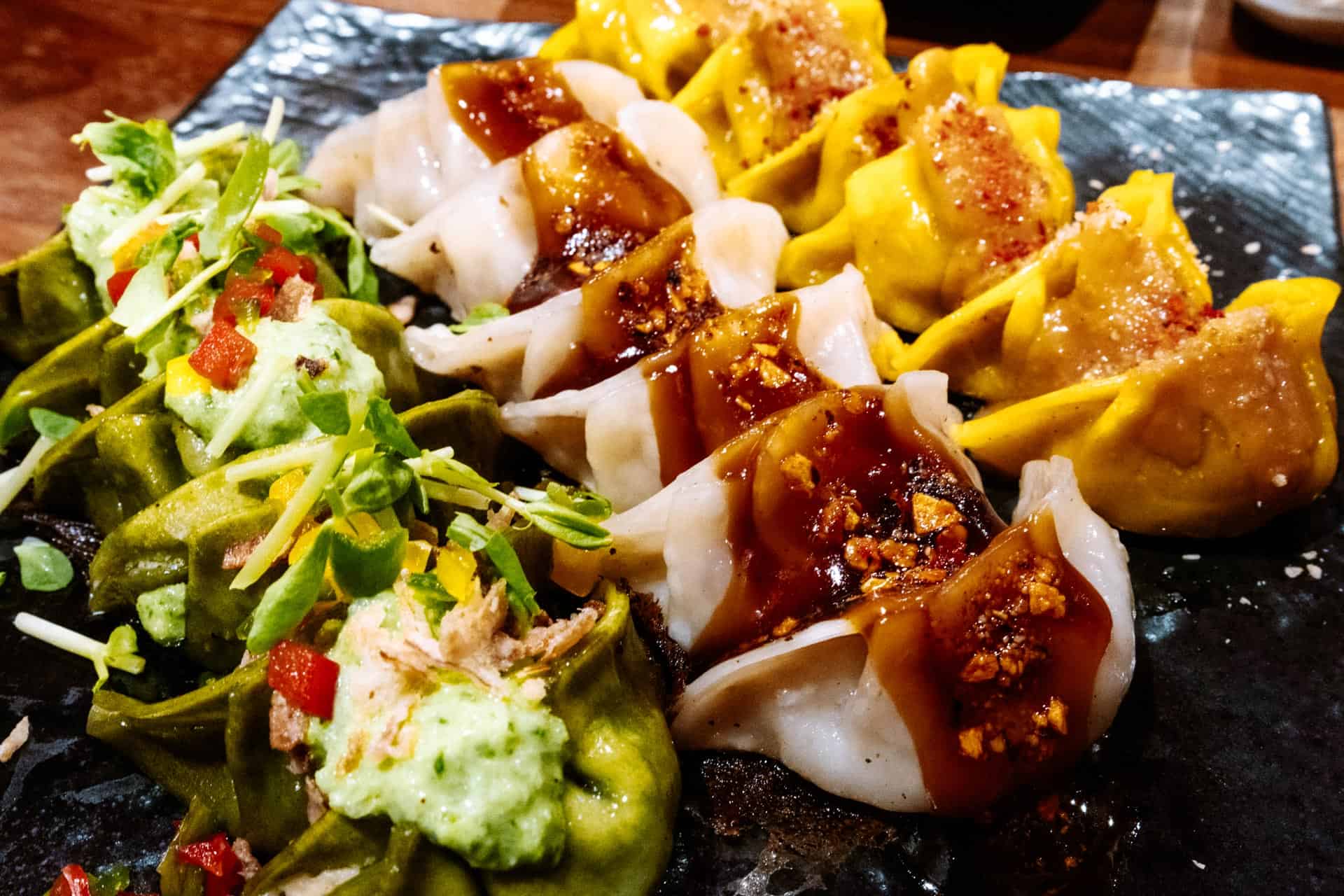
Tempura Ebihachi
Tempura Ebihachi is without a doubt the best tempura we’ve ever had!
We ordered the Hana set. It came with 2 shrimp, 6 vegetables, rice, and miso soup. The owner taught us three new ways to eat tempura: dipping in salt, dipping in curry powder, and dipping in both!
We’ve always dipped our tempura in tempura sauce but the salt was fantastic! 😍 We also each had a glass of plum sake to go with our dinner.
The chef speaks some English, which is helpful. The restaurant is small and cozy, giving it a true Japanese experience. Since seating is limited, you are not allowed to share meals.
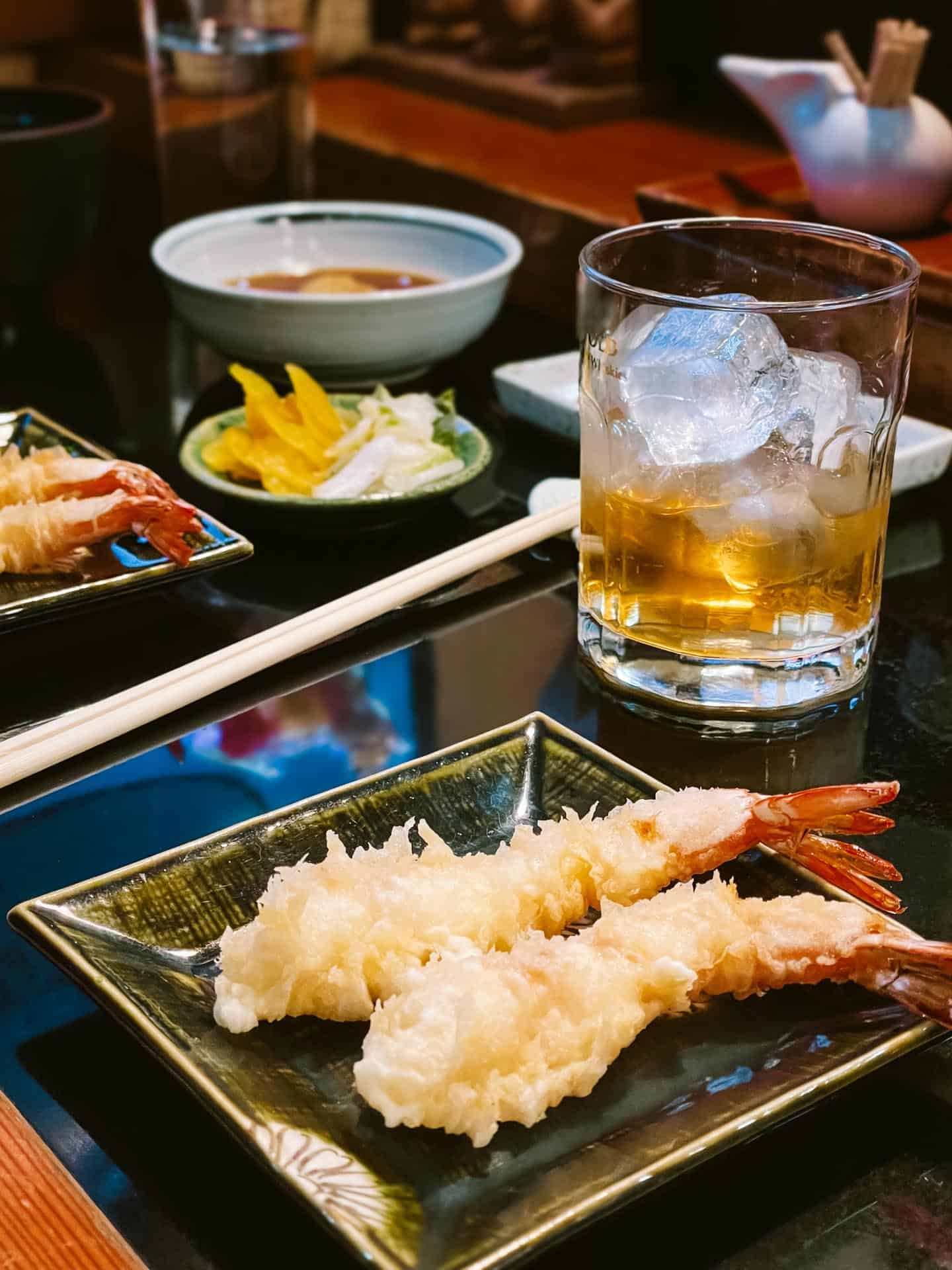
Other Places to Eat
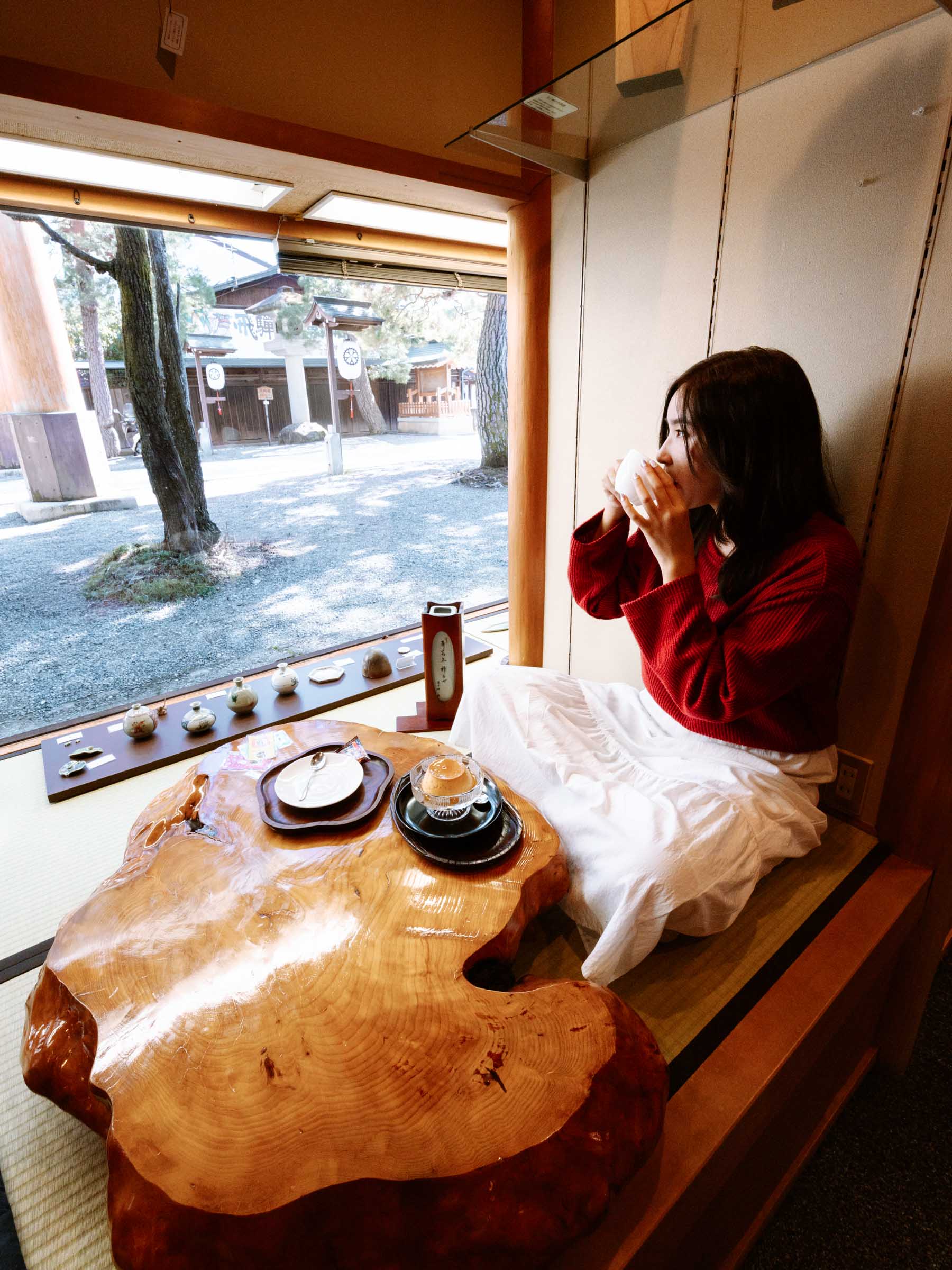
Where to Stay in Takayama
We stayed at both a traditional Ryokan and a Western-style hotel during our visits to Takayama. Both were exceptionally wonderful, super clean, and comfortable.
Here are the places we stayed at in Takayama and our recommendations:
- Hostel Murasaki – Japanese-style ryokan: Staying in this ryokan gives you that traditional feeling like you’re in old Japan. It is also budget-friendly. The ryokan has a shared kitchen so you can cook your food and a large living room to meet other travelers.
- Koko Hotel – Western-style hotel: This hotel is a new and modern accommodation. The rooms are clean and comfortable, but a bit on the smaller side, which is normal for Japan. The lounge area in the hotel’s lobby opens up in the afternoon, so you’re free to sit and work there and enjoy free drinks.
- Hotel Wood – A cross between a traditional Japanese ryokan and a modern hotel. Located right in Takayama’s scenic old town district.
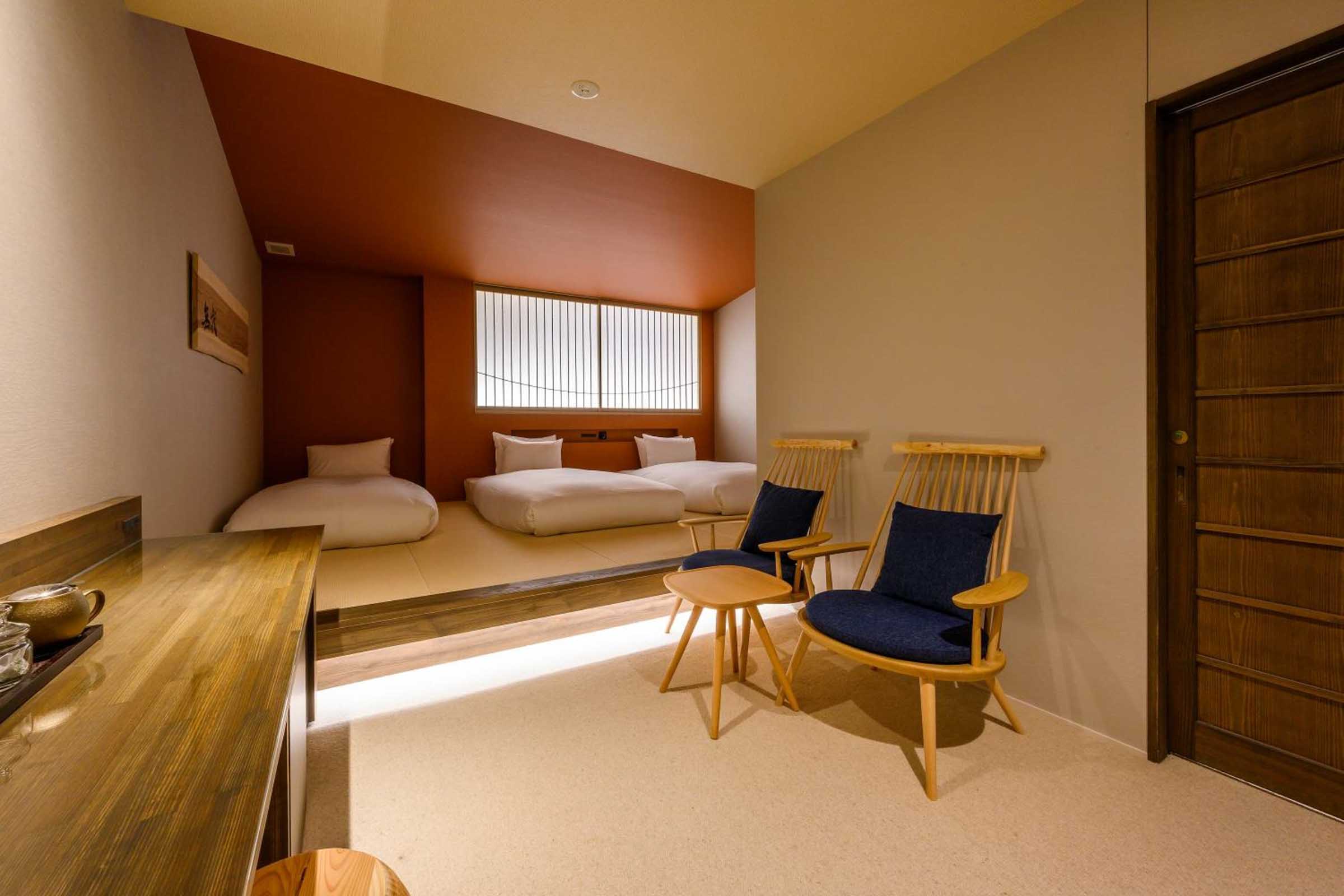
How to Get to Takayama
There are two ways to get to Takayama by public transportation: Train or bus.
Nagoya is the closest major city to Takayama, so most train routes to Takayama pass through Nagoya. If you’re taking the Shinkansen from Tokyo, Kyoto, or Osaka, expect to stop in Nagoya along the way.
Alternatively, you can take a bus from these cities, which is a more budget-friendly option and only slightly longer in travel time.
For example, while the train ride from Tokyo to Takayama takes about 5 hours, the bus ride is just an hour longer at 6 hours. Plus, with the bus, there’s no need to transfer or juggle luggage between trains.
Japanese buses are clean and reliable, making them a hassle-free option, especially if you’re carrying a lot of bags. However, keep in mind they may not be as spacious or comfortable as a train.
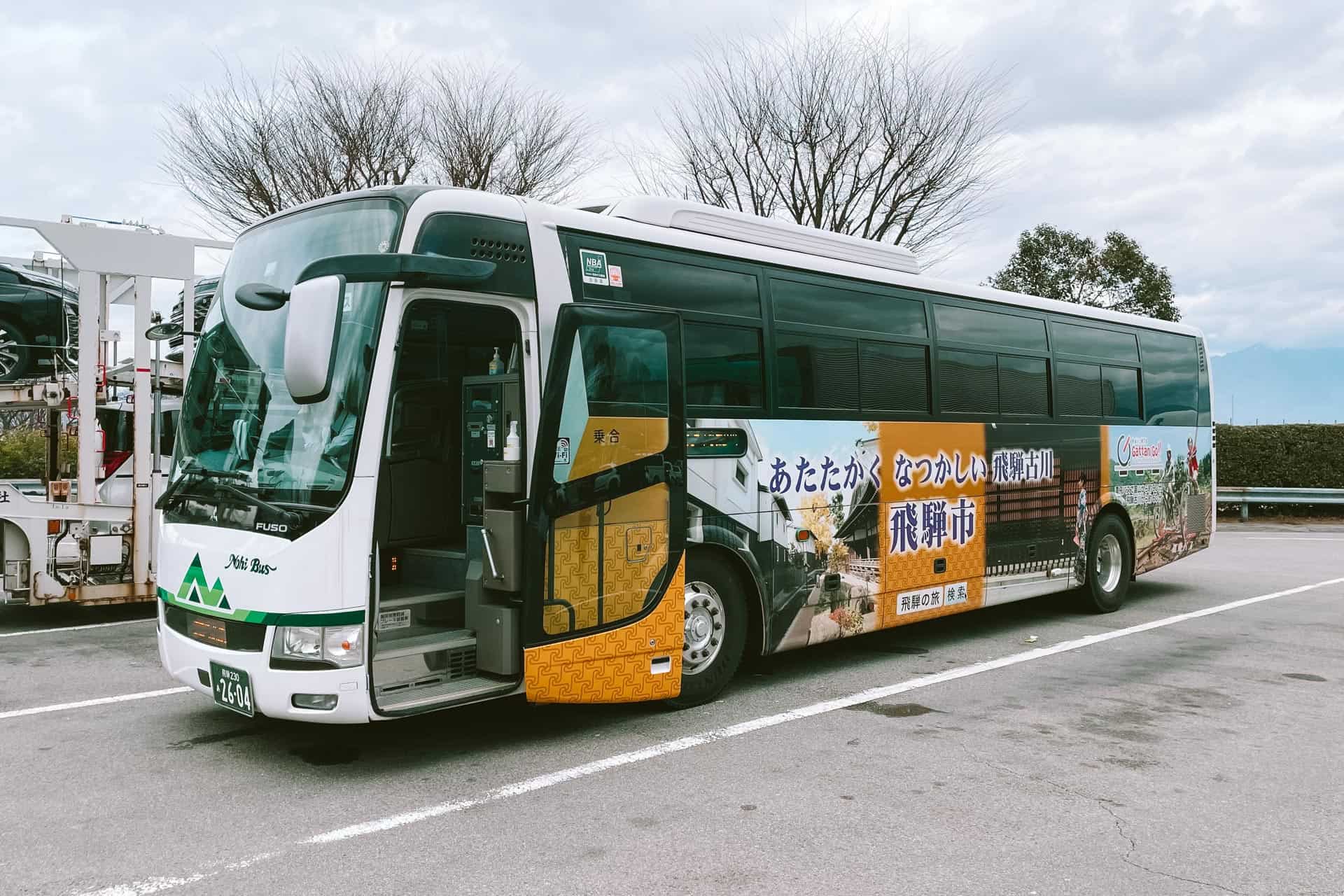
Best Time to Visit Takayama
We recommend visiting Takayama in either spring or autumn. These seasons have the best weather for exploring the town, with mild temperatures. In spring, you’ll catch the cherry blossoms in bloom, while autumn brings vibrant colors to the trees. Both times of year make for an ideal visit.
- Spring (late March to May): The weather is cool, but not too cold. The Takayama Spring Festival happens in April, around the same time as the cherry blossoms!
- Summer (June, July, and August): Summer in Takayama is the rainy season. While the weather can be nice for outdoor activities, it tends to be humid and wet during the summer.
- Autumn (October to November): The temperatures haven’t gotten too cold and the leaves start to change colors in late October and early November. The Takayama Autumn Festival also happens in October!
- Winter (December, January, and February): Winter in Takayama is cold and snowy. While there won’t be many crowds in Takayama during the winter, it is a tough time to visit since Takayama gets a decent amount of snowfall.
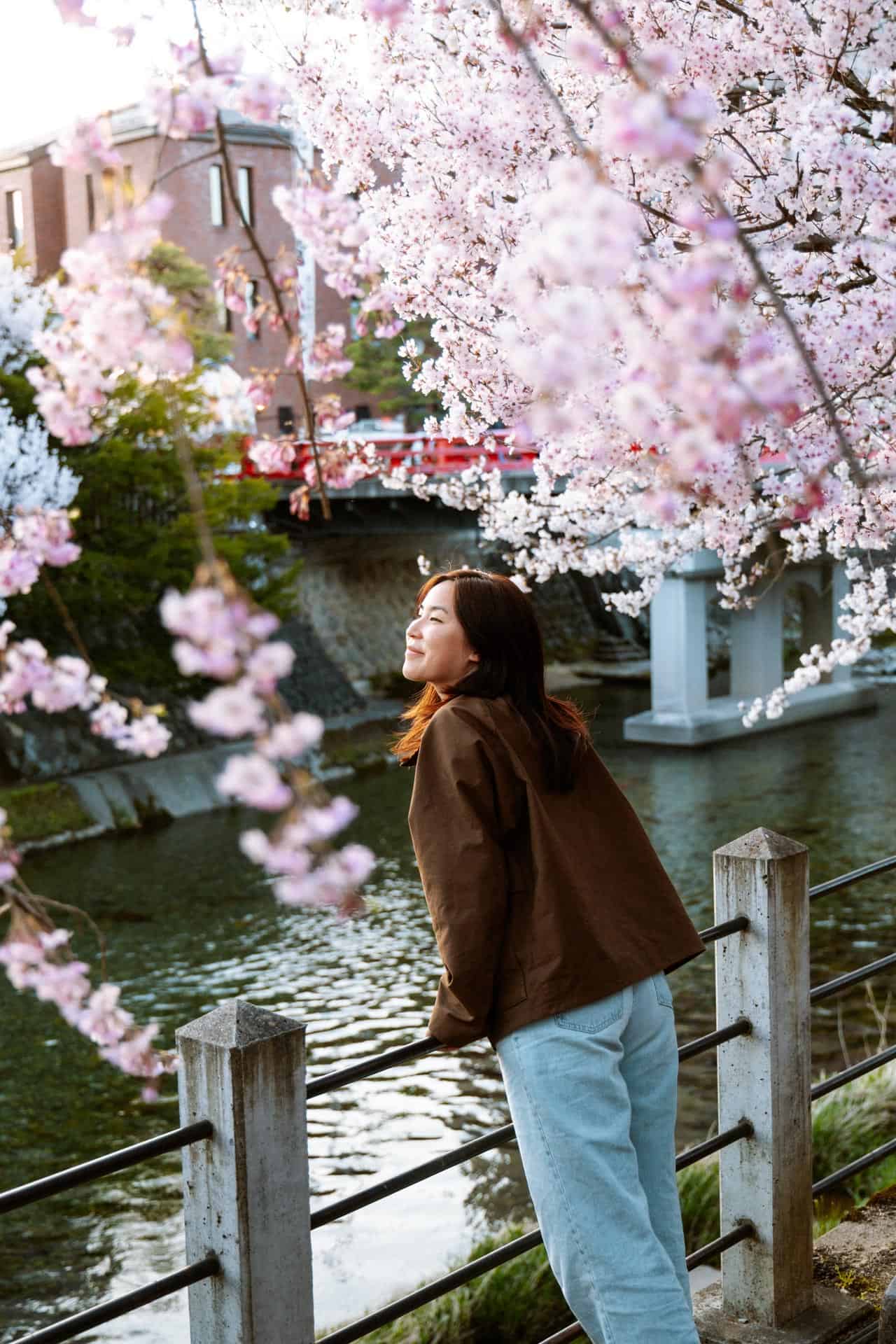
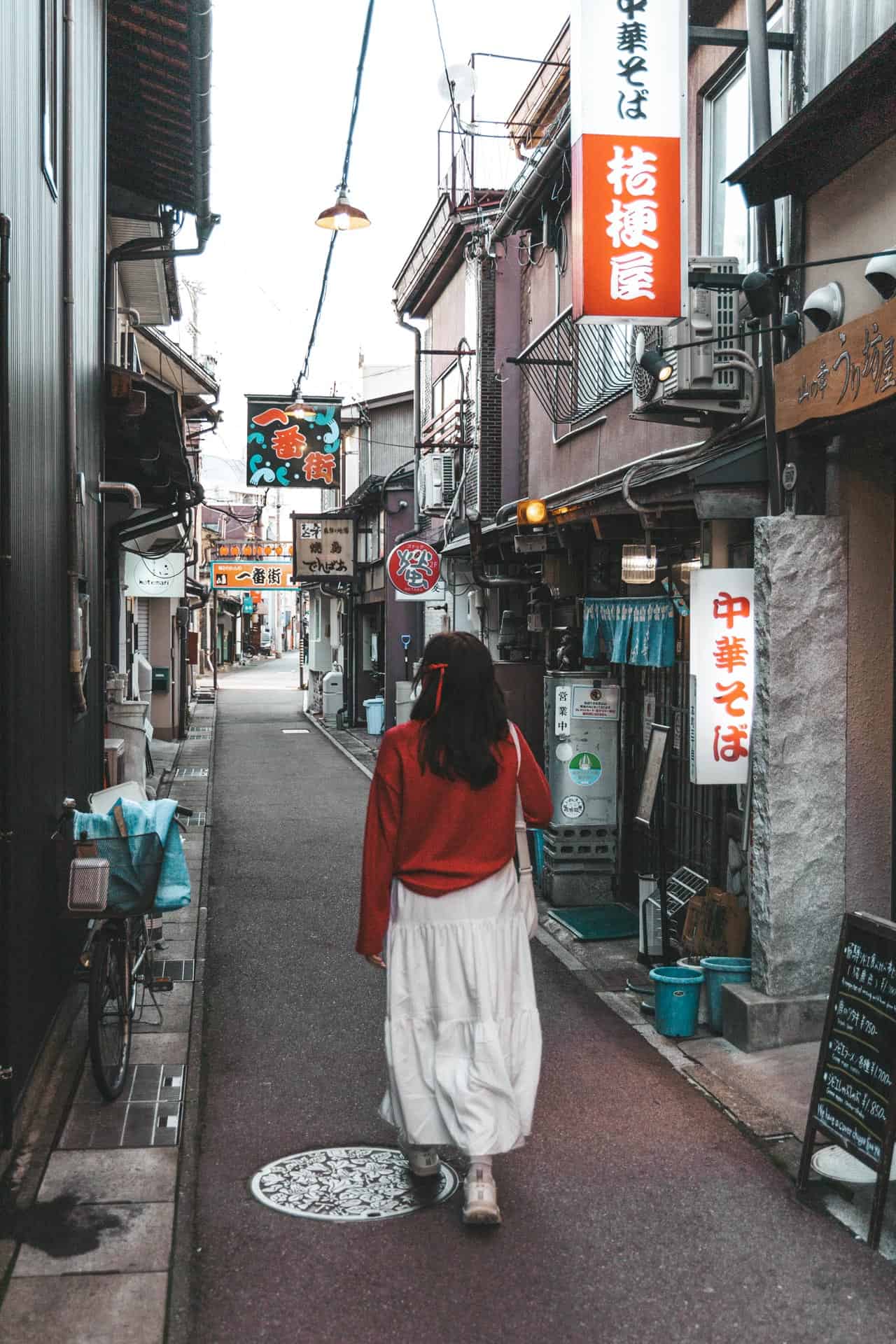
How many days should you stay in Takayama?
I recommend spending 2-3 days in Takayama. 1 day is not enough to get the most out of your visit to Takayama.
How to get around Takayama
You do not need a car to get around Takayama. Most things in Takayama are within walking distance of each other. For places that are just outside of the Takayama City Center, you can use the bus to get there.
Alternatively, you can rent a bicycle to get around Takayama. That’s what we did the first time we visited the town.
Here are two places in Takayama where you can rent bicycles:
If you drive a car to Takayama, check with your accommodation about parking. Many places do not have on-site parking, and you may need to pay to park in a nearby lot.

Our Free Takayana Google Maps Locations
Do you need a handy map with all our Takayama locations? We’ve got a Google Map with all the Takayama locations in this post (plus a LOT more). Sign up in the box below and we’ll deliver it right to your inbox, plus our top tips to help you plan your Takayama adventure.
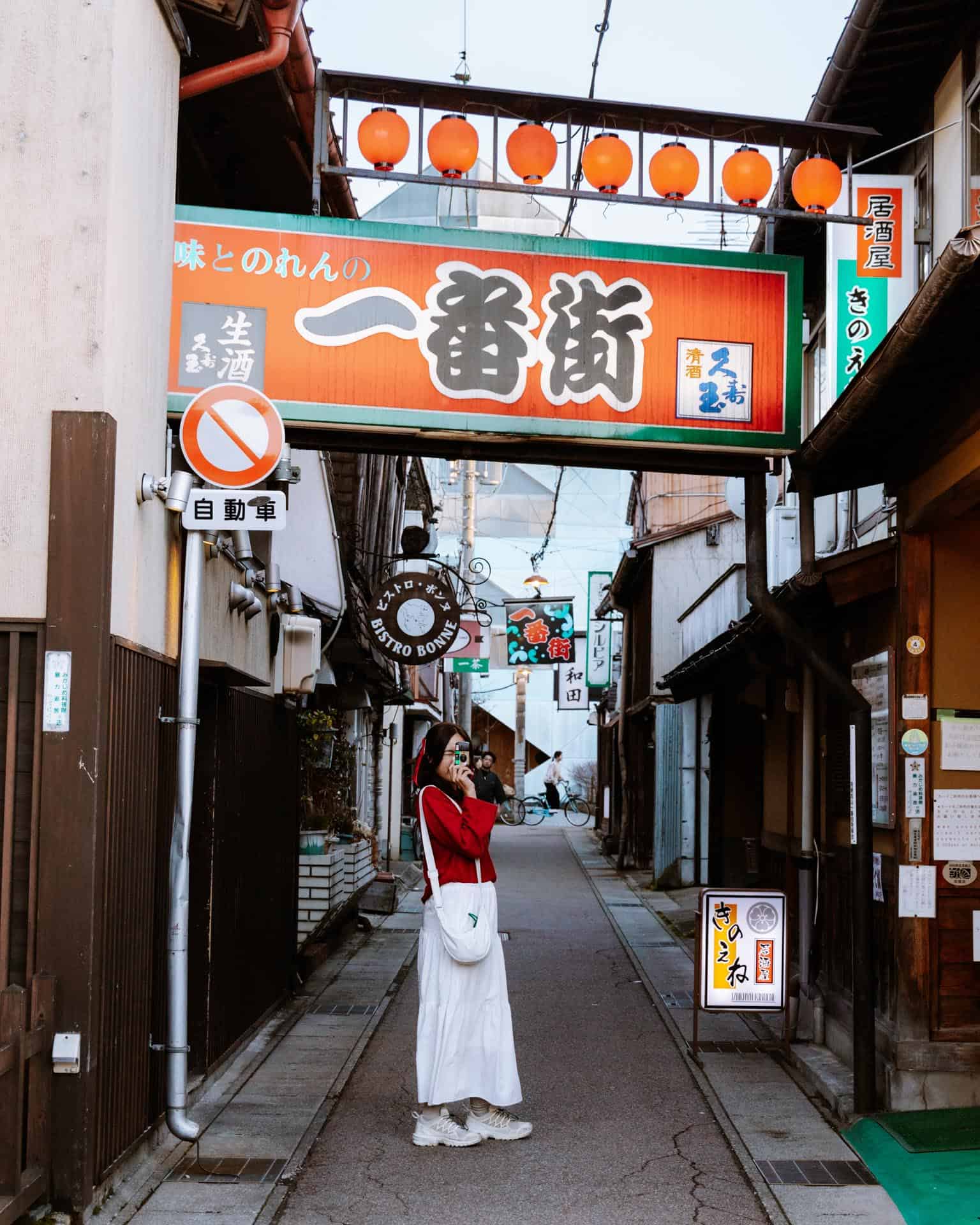
Our Takayama YouTube Video
Are You Following Our Takayama Blog Series?
We’ve been to Takayama three times and found so many awesome things to do there. To help you plan your trip to Takayama, we’ve put together guides to the best places we found. You can check them out by clicking the links below.
- Our Ultimate Guide to Takayama: 17 Awesome Things to Do in Takayama
- How to plan your trip to Takayama: Takayama 2 Day Itinerary
- Our Takayama accomodation guide: Where to Stay in Takayama: Guide to the Best Areas and Hotels
- We attended Takayama Spring Festival and put together a guide to help you navigate the crowds: Takayama Festival: Our Complete Guide
- Our favorite hike in Takayama: Higashiyama Walking Course
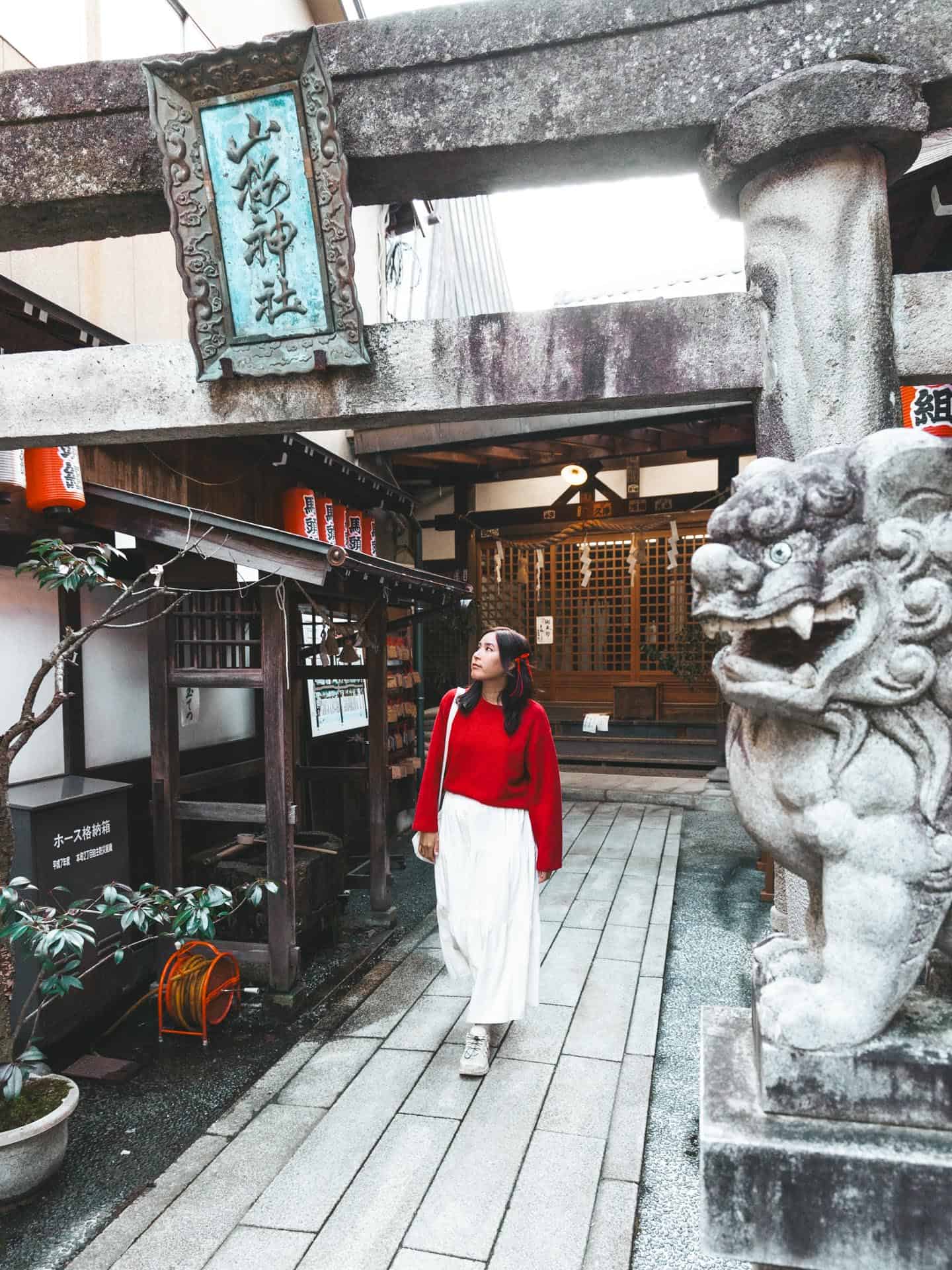
I hope you enjoyed our guide to things to do in Takayama, Japan. Feel free to leave a comment below if you have any questions 🐸


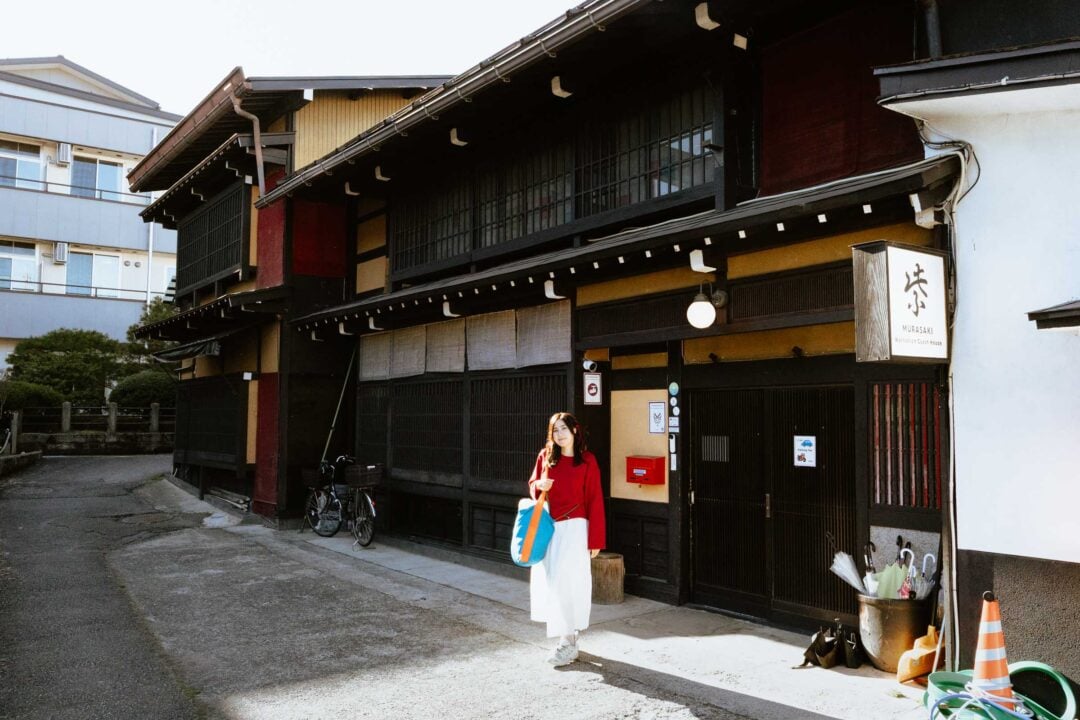

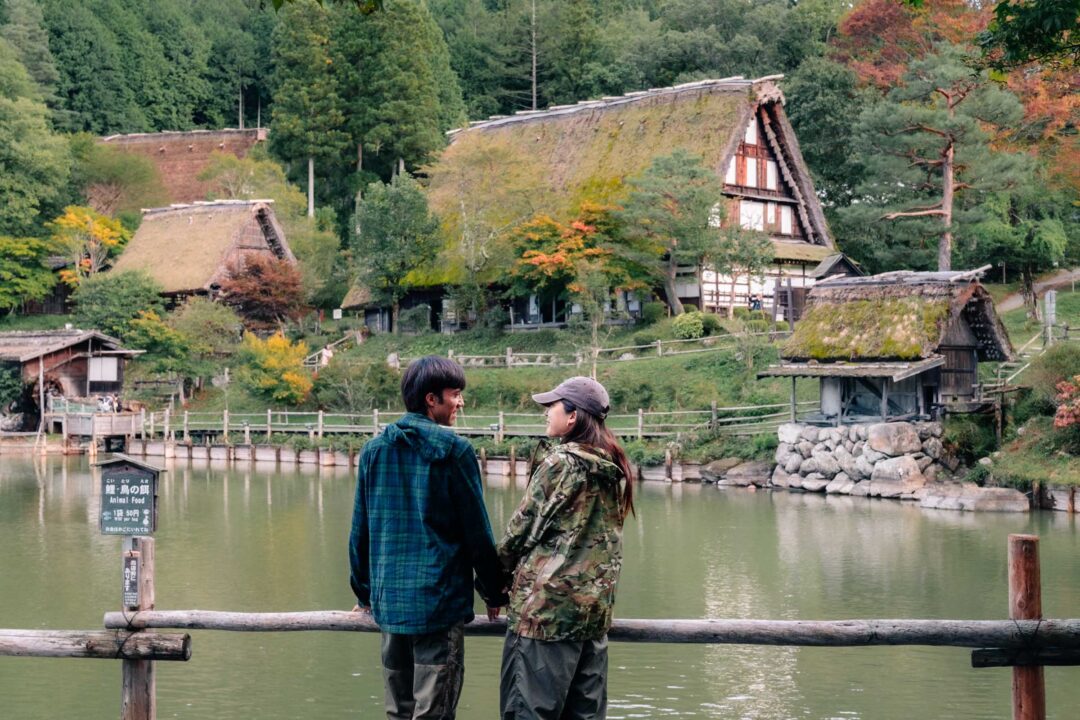
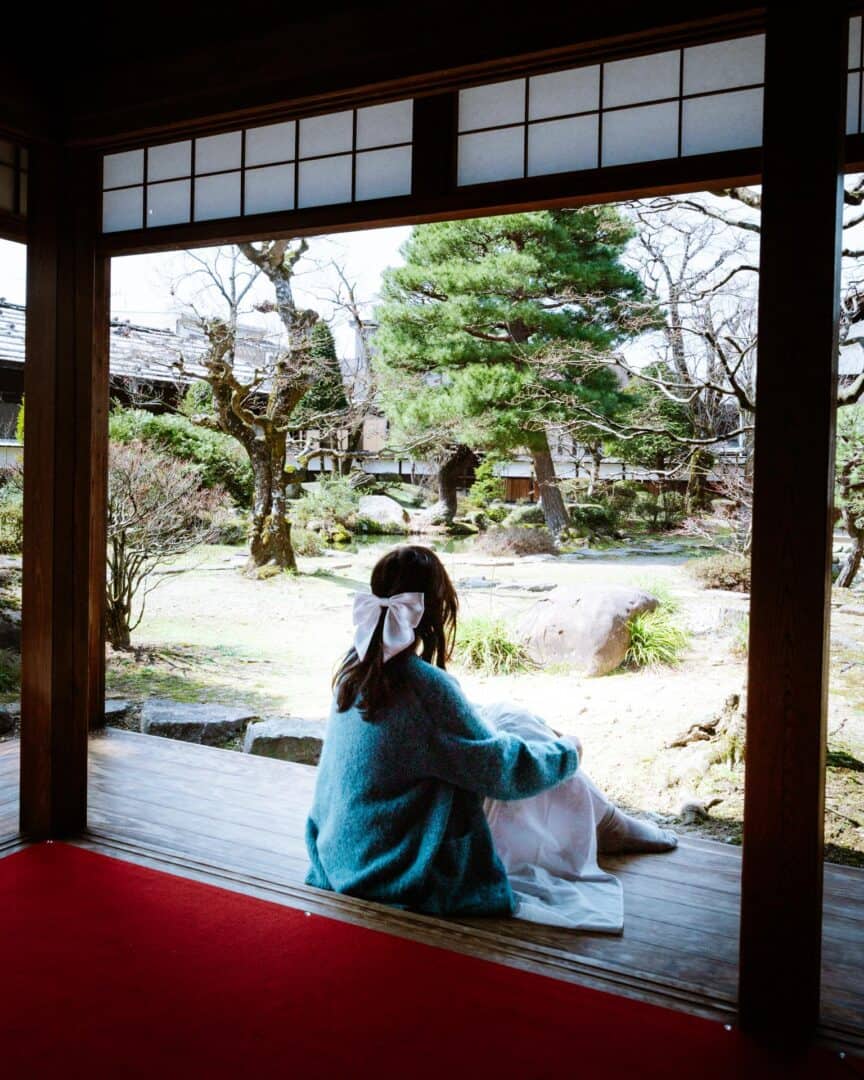


Super helpful! We are going in a few weeks and really looking forward to it. Question for you – Homeitaigumi… is there a specific street to look for? I am trying to put together google map plans and not finding this specific area in the search.
It’s marked in our Takayama Google Maps
Magnífica información…detallada y clara.
Me ha servido mucho
Gracias